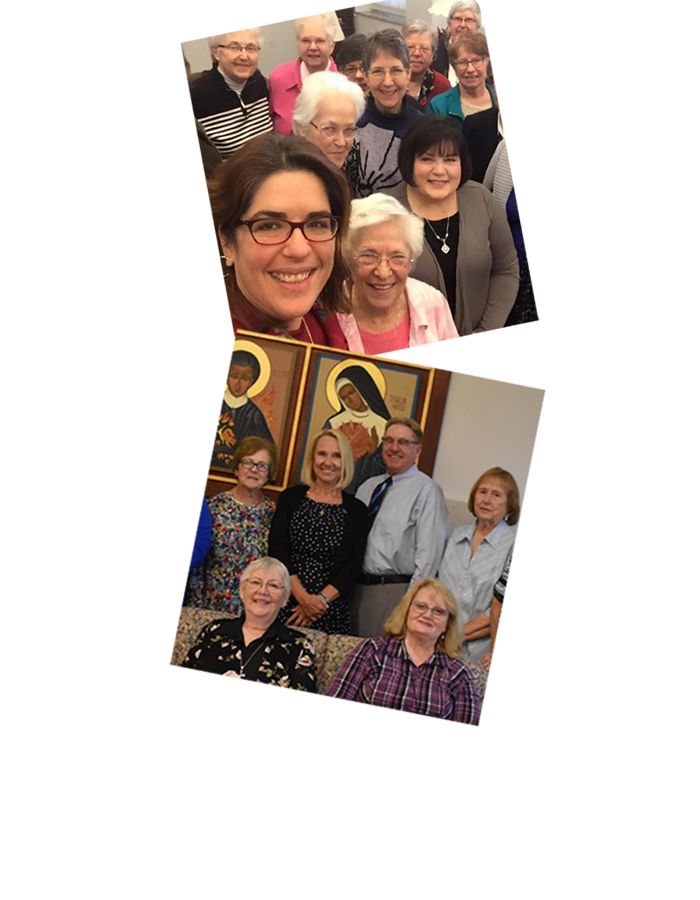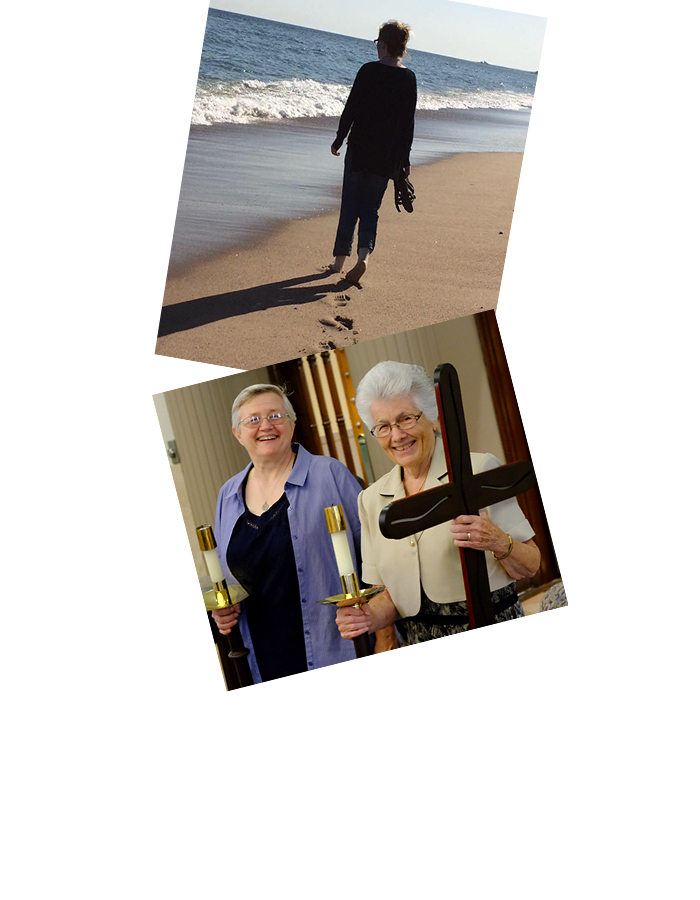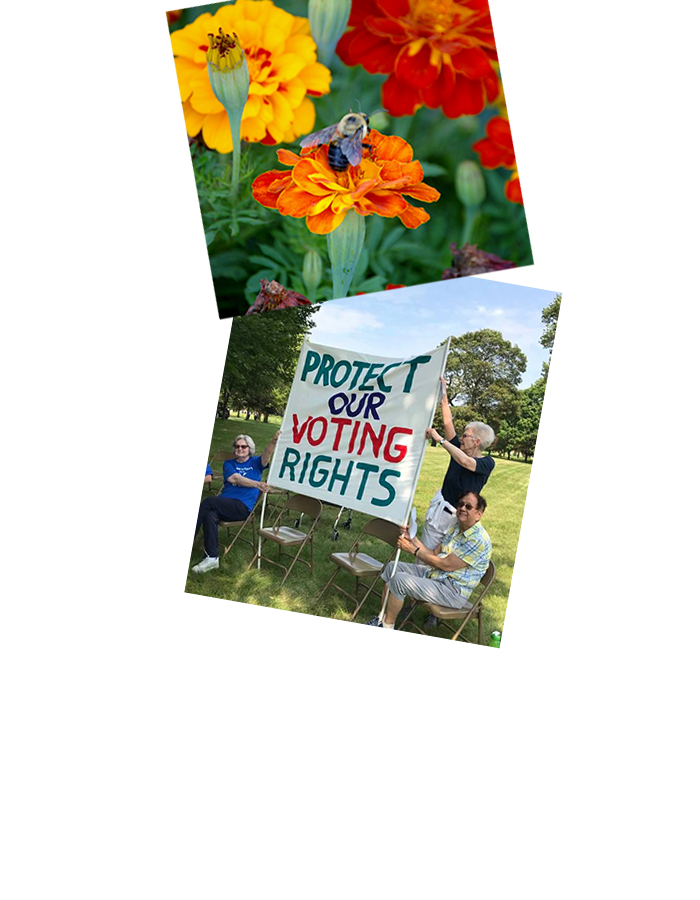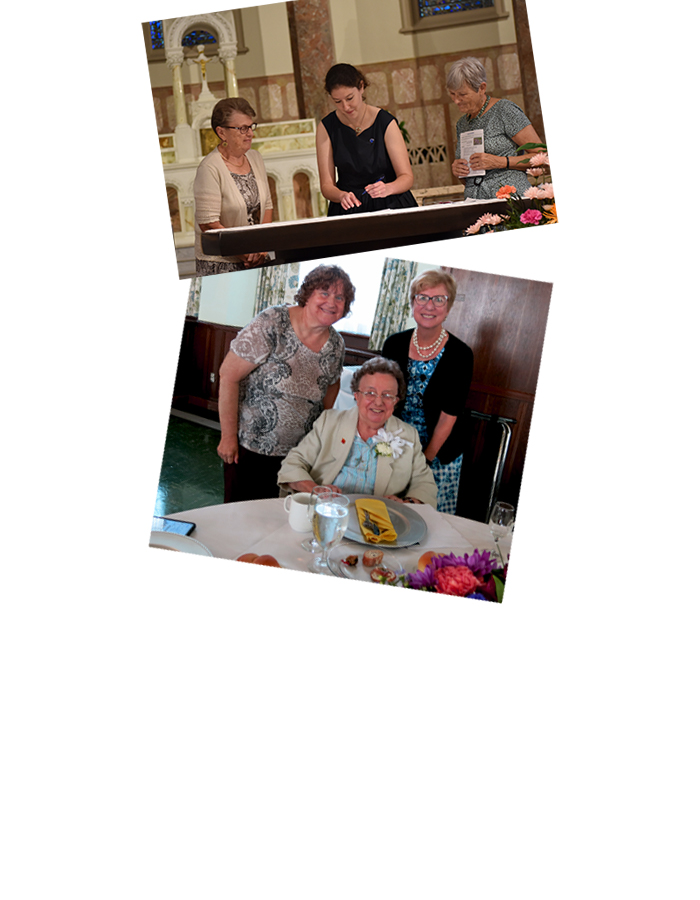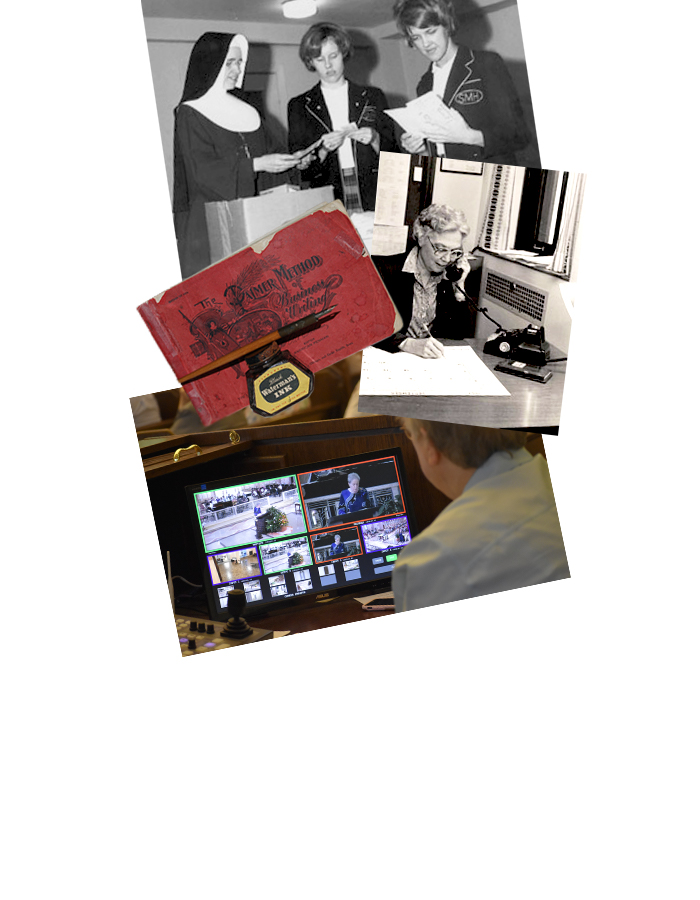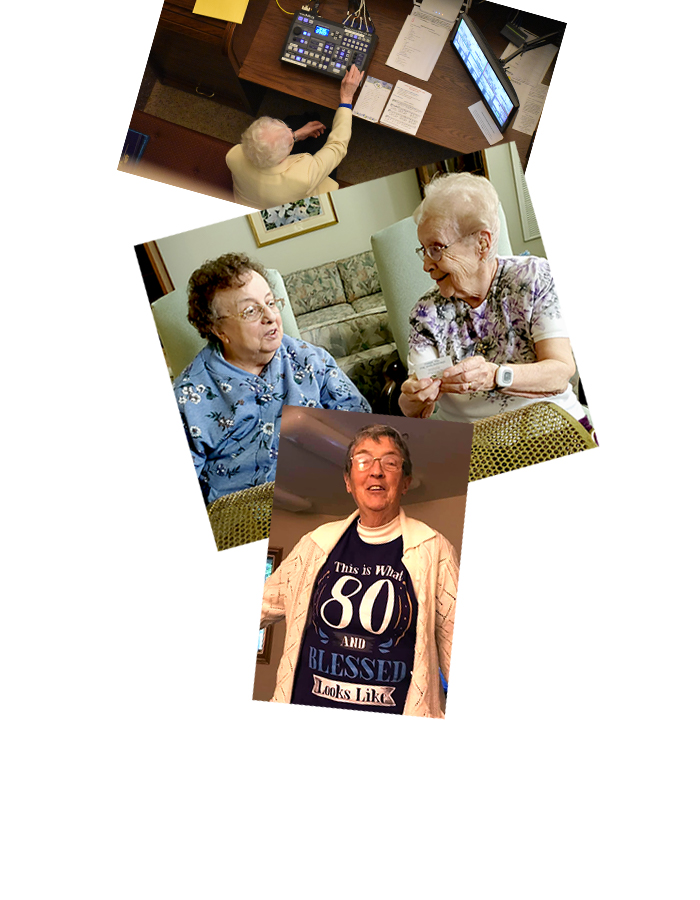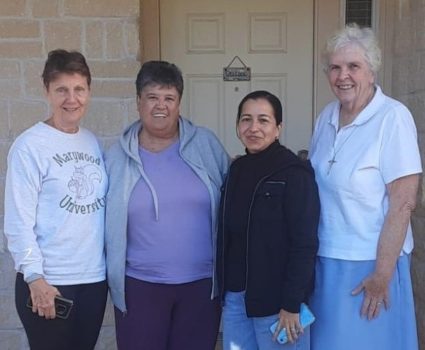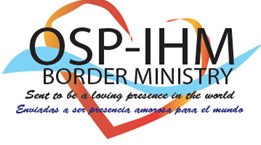
The Monroe IHM community shares a common origin with three other religious communities: the Pennsylvania-based Sisters, Servants of the Immaculate Heart of Mary of Scranton; Sisters, Servants of the Immaculate Heart of Mary in Immaculata; and the Oblate Sisters of Providence in Baltimore. Sisters from our shared communities have established a community in McAllen, Texas. Sisters Mary Elaine Anderson (Scranton), Elvia Mata Ortega (Scranton), Carmen Armenta Lara (Monroe) and Rose Patrice Kuhn (Immaculata) are the core group of sisters who live and minister in McAllen. With this creation of an inter-congregational community, our sisters can directly serve asylum seekers who need temporary respite and help to contact their sponsors in the U.S. Below are monthly updates.
June 2025
A Collaboration of Care – Immigrant Accompaniment at the U.S.-Mexico Border
By Melanie Menkevich and Dr. Catherine E. Wilson

Between June 1-6, 2025, the Immaculate Heart of Mary sisters in McAllen, Texas, graciously hosted us to more fully understand the challenges faced by immigrants at the U.S.- Mexico border as well as the multilayered response by a range of nonprofits providing respite, services and accompaniment to those facing an uncertain future. The best way to describe what we observed firsthand in the Rio Grande Valley and in Reynosa, Mexico, was a collaborative nonprofit network of care and concern. Given that immigration is a dynamic and complex issue which touches every dimension of the human person, it was only fitting that we witnessed a loving outreach among a variety of religious orders, such as the IHM Sisters, the Jesuits, the Sisters of Mercy and the Daughters of Charity, as they meet immigrants exactly where they are – in the midst of their challenges and dreams for a better life.
This collaboration of care takes shape in various ways – from providing opportunities for worship to designing workshops in art and dance therapy, to developing activities to help pass the time, strengthen community ties and build lasting memories. We played Lotteria with families, kicked around a soccer ball with young siblings and sang songs in Spanish. We learned about the dedication to mastering the skill of weaving artistic and colorful patterns in plastic, with the goal of teaching it to women and children.

In border cities like Reynosa, other nongovernmental organizations, such as Save the Children, the United Nations and Doctors Without Borders, further extend this collaborative network by offering educational support to immigrant children and medical assistance to all immigrants in their respective situations. There was also collaboration amongst the migrants in waiting – people from different countries passing the time together, sharing child care duties, offering support and solace and joining together in prayer. Our time spent there was bittersweet; it was a beautiful experience to witness the collaborative spirit of care among religious workers and migrants, while simultaneously heartbreaking to realize the uncertainty that the migrants face.
Volunteering at this border mission embodied the true spirit of reciprocity; we’ll never forget the impressions that these people made on us. It brings a new perspective to the work being done at the IHM Center for Literacy, as many of our students have made a similar journey and arrived at their destination, only to now face the same uncertainty that they are at the border. Before visiting the border, we were informed about the changes it would undergo after being closed, with fewer people passing through; however, there is still work to be done for migrants who need a hopeful presence on both sides of the border and beyond.
Looking back on our visit, it was fitting that our visit to the U.S.-Mexico border took place at the start of Immigrant Heritage Month, a month in June dedicated to celebrating the many contributions that immigrants have made in the United States. We are grateful to the IHM Sisters for their generous hospitality in McAllen, Texas, as well as for their heartfelt dedication to immigrant accompaniment. Their work, as part of this larger nonprofit network at the border, allows the American public to recognize and advocate for the challenges faced and contributions made by immigrant communities in our midst.
Melanie Menkevich, MPA, is Executive Director of the IHM Center for Literacy in Northeast Philadelphia and Dr. Catherine Wilson is Associate Professor of Public Administration at Villanova University.
May 2025

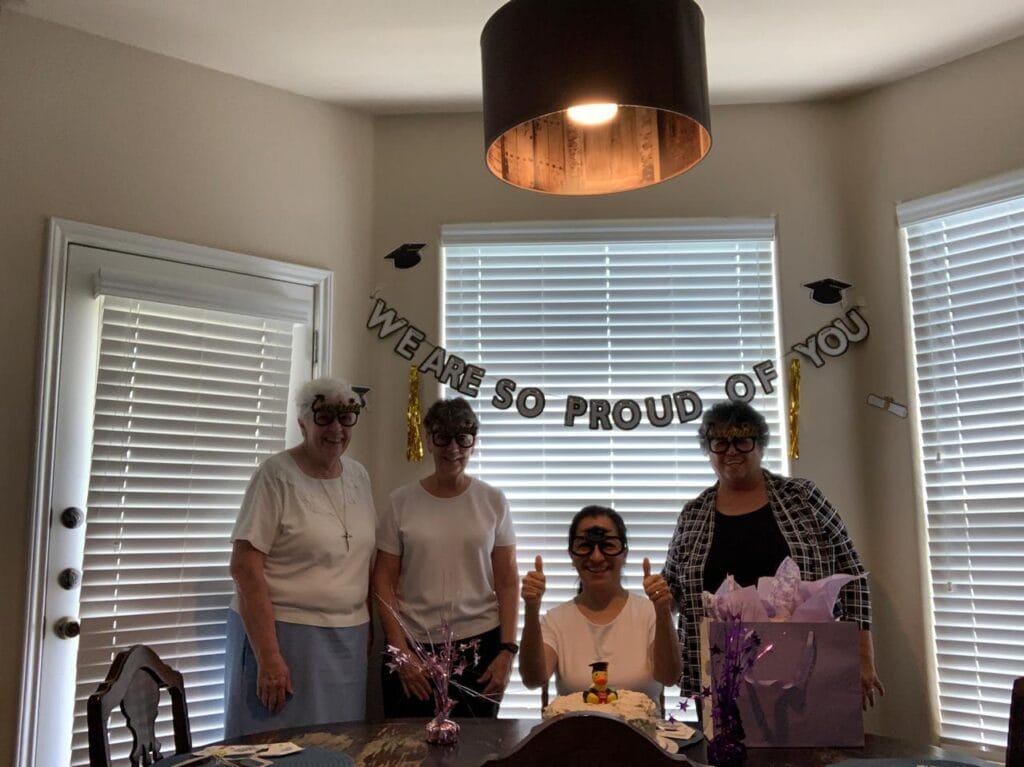


The OSP-IHM Border Mission has been ministering to migrants for almost three years. We are grateful to the 55 sisters and associates who have volunteered with us. Nine of our sisters even returned for a second time to volunteer. We would like to thank the SOAR! Foundation that helped us establish our mission in McAllen, Texas, and during these past years has financed the airfare and food stipend of sisters 65+ who wished to volunteer for a brief time at the US-Mexico Border. Although the SOAR! grant ends in June 2025, we hope sisters and associates will continue to collaborate with us as we accompany our migrant brothers and sisters on both sides of the border.
April 2025
by Sister Mary Elaine Anderson, IHM
“How much contempt is stirred up at times towards the vulnerable, the marginalized,
and migrants! On this day, I would like all of us to hope anew and to revive
our trust in others, including those who are different than ourselves,
or who come from distant lands, bringing unfamiliar customs,
ways of life and ideas! For all of us are children of God!”
Pope Francis (Easter, April 20, 2025)
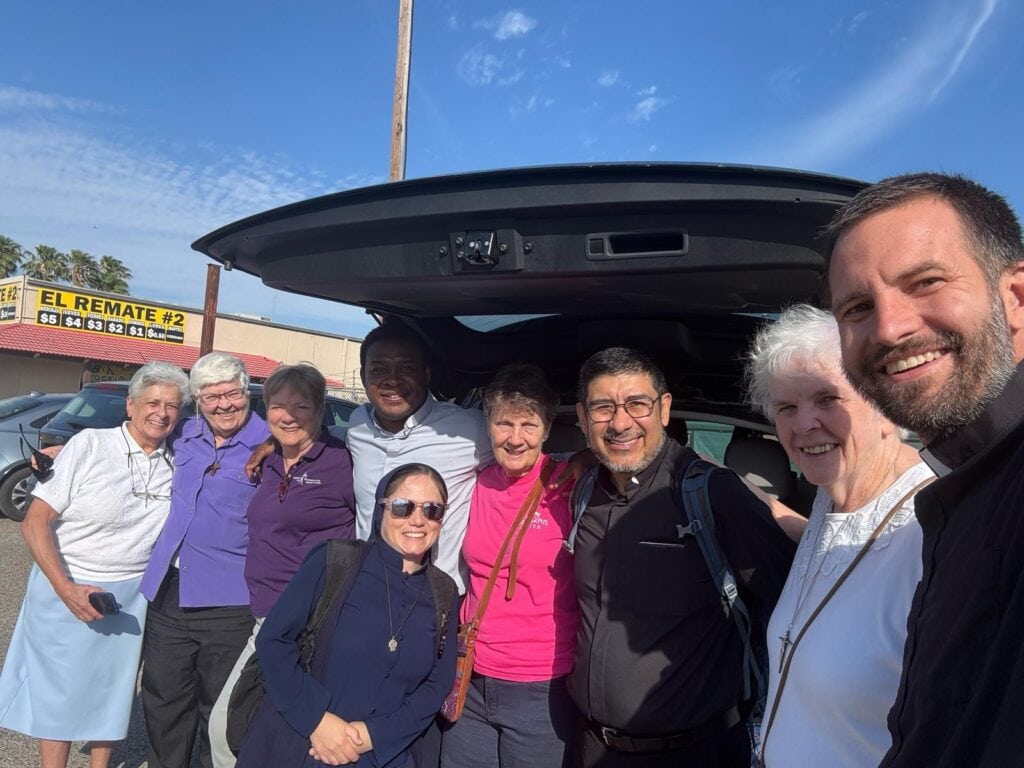
the border to cross into Mexico
In his final Easter address, Pope Francis courageously points out the antagonistic and intimidating reality that the marginalized experience in our world today. He invites us to hope and trust in all God’s children. For we IHMs, it is a call to fully embody our charism and proclaim in our everyday life God’s unconditional love for all, especially the most vulnerable among us.
Since the executive order Jan. 20, which terminated the CBP One App and left migrants with no legal way to enter the U.S., the OSP-IHM Core Community has been discerning and exploring with other men and women religious the direction our ministry at the border will take. Daily, we hear about hostile actions being taken against our migrant brothers and sisters. We are witnesses to the acute suffering of those whose dream to enter the U.S. was extinguished, the fear and the confusion of those who have been deported to countries where their life is in danger, and the uncertainty of those who live under the constant threat of being deported.
We recognize the urgency to stand in solidarity with and accompany our migrant brothers and sisters. The OSP-IHM Border Ministry is one of collaboration. Many of our OSP and IHM sisters, associates and friends have volunteered for a brief time. Our most recent volunteers were Sister Ann Berendes (Scranton IHM) and Sister Patricia Godoy (Immaculata IHM). What follows is Sister Patricia’s reflection on her time at the border.
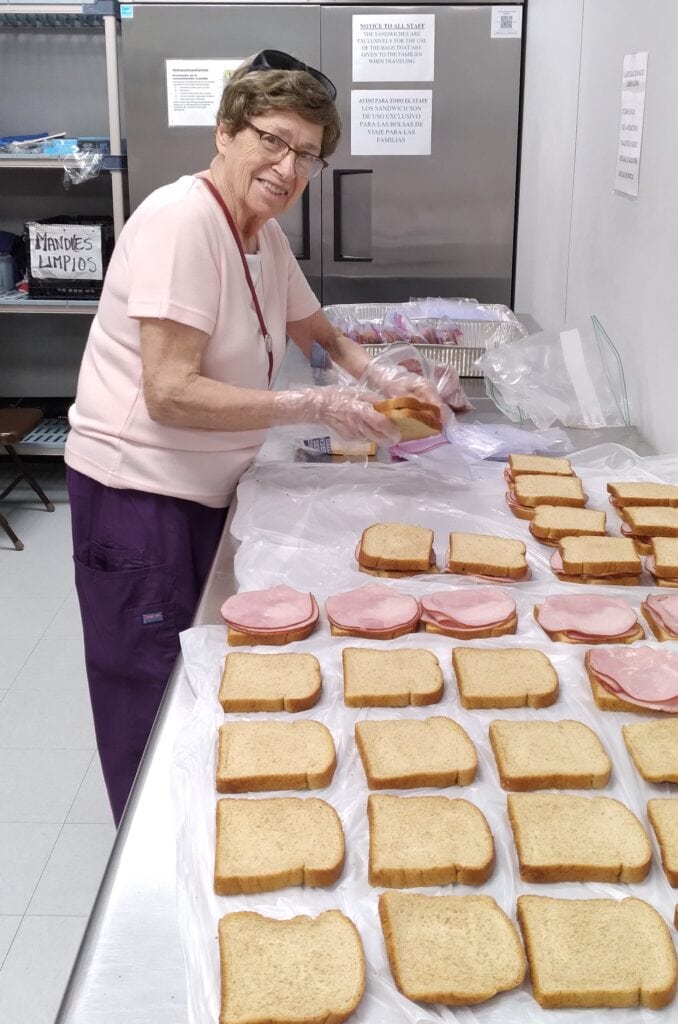
“My two-week experience at the border has been a time of wanting to bless and of also being deeply blest in a setting where our migrant brothers and sisters are suffering. It has been a cry for us to come together to alleviate the unbearable anguish of many families who seek the safety and security each human being deserves, along with the opportunity to grow and live with dignity. They have wanted to do things “the right way,” but now the doors are tightly closed, and they experience the anguish of probable deportation, and living in a state of ‘limbo’ with nowhere to go.”
Our Sisters participating in the OSP-IHM Border Ministry, truly pilgrims of hope, creatively give their “all” to alleviate, console, accompany and encourage God’s good people. To relieve this suffering, they have joined together with religious and priests of other congregations. In these two weeks, they have worked together with Sisters of Mercy, a Franciscan sister, Sisters of the Holy Spirit and Mary Immaculate, a Daughter of Charity of St. Vincent de Paul, Jesuit priests and seminarians. With joy and hope, each person uses their unique gifts to lift up God’s People.
“From him the whole body, joined and held together by every supporting ligament, grows and builds itself up in love, as each part does its work.” Ephesians 4:16
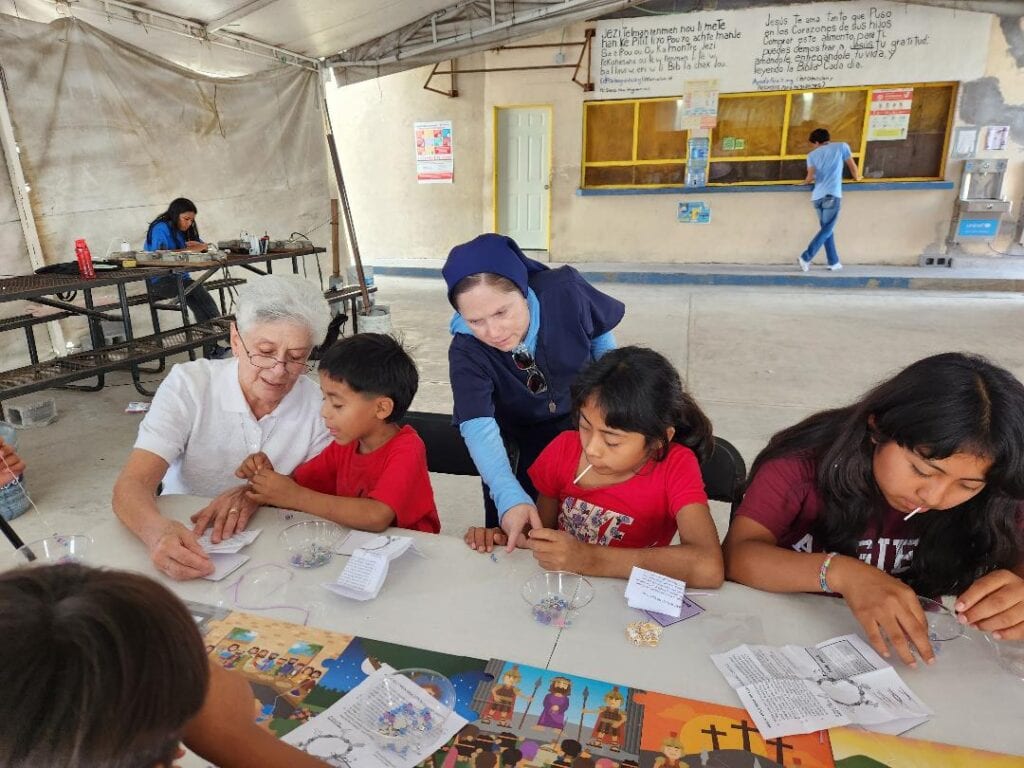
I am also certain that our sisters everywhere, with their prayers, concern and support are a vital part of nourishing this ministry with God’s blessing and grace. For this very brief time, being a witness and participant in this endeavor, I have been profoundly blest with an even deeper longing to build up the Kingdom of God, and so I return to my sisters and ministry with this holy yearning. As I leave, I don’t LEAVE. God’s people in need are permanently “tattooed” in my heart.
February 2025
By Margaret Chapman, IHM, Marianne Gaynor, IHM, Jane Herb, IHM
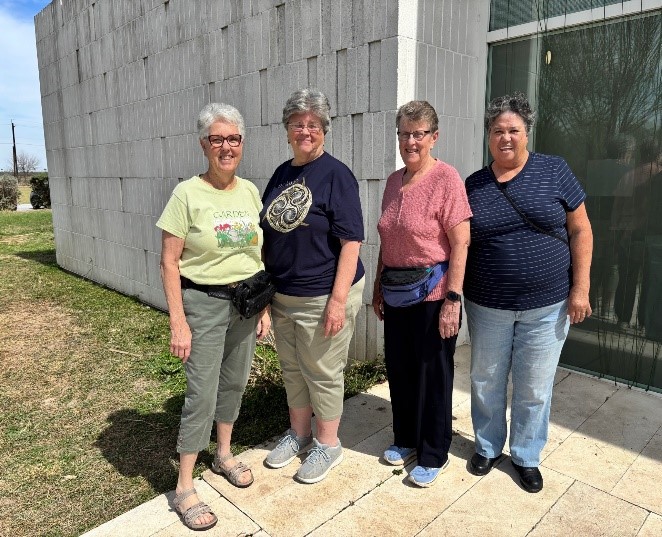
Upon our arrival in McAllen, February 8, we were greeted by our sisters, Carmen, Mary Elaine, and Rose, and a strong, warm wind. We knew our volunteer experience would be different because of the order terminating the CBP-One App, canceling all border appointments for legal entry into the United States. However, the strong wind we were greeted by became a metaphor for how different ministry here at the border has become because of the shifting realities. In the spirit of all IHMs and collaboration with women and men from other religious communities, the ministry is finding new pathways to offer compassionate accompaniment to those seeking safety. Our sisters are making new paths by walking and we were privileged to walk a bit of the journey with them during our own personal journeys of renewal.
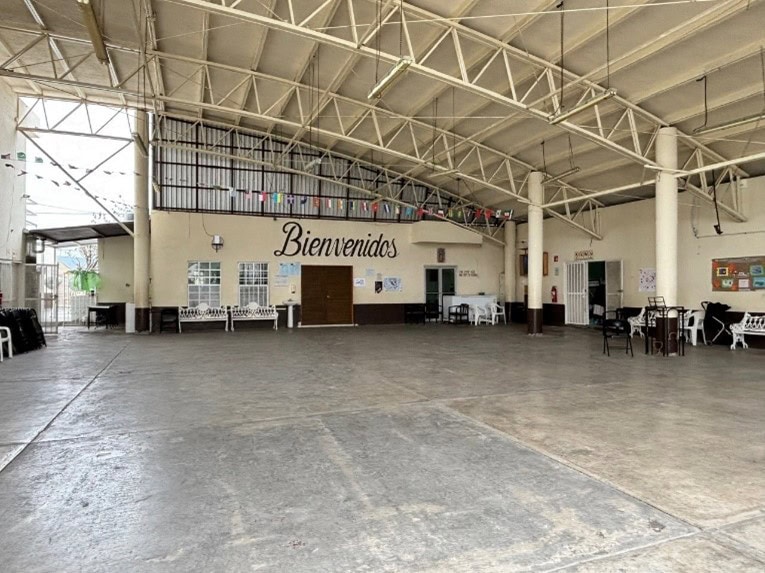
Despite the sad emptiness of the Humanitarian Respite Center in McAllen, we still found ways to assist. We prepared for the future return of migrants by organizing donated resources (clothes, medicines, children’s books, toys, etc.) so that staff and other volunteers could more easily locate needed items for distribution. You can only imagine how disorganized things can become when serving 800 people daily!
Carmen discovered the need for more volunteers at a food pantry run by parishioners from Our Lady of Guadalupe parish in Mission, Texas, the next town over from McAllen. We accompanied her each week to assist with packing and distribution. Many receiving these food packages were first —and second-generation migrants, some with documents, some without. Carmen has become a valued member of this group of volunteers, who also welcomed us.
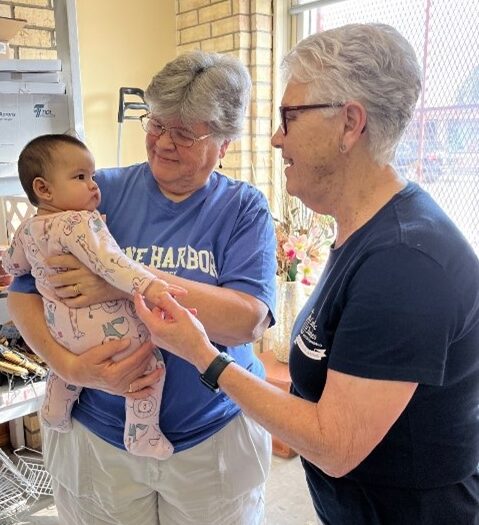
The sisters have reconnected with a longer-term shelter, La Posada de Providencia, in San Benito, Texas. The hourlong car ride from McAllen to San Benito was worth the joy of meeting and spending time with the resident migrants and their families. These residents came into our country legally before Jan. 20 and journeyed to this shelter from other temporary shelters along the southern border. Here, they may find temporary employment, take English classes and enroll their children in school. Carmen, along with the help of our newly acquired “expertise,” in the art of needle plastic work, was able to teach the women a relaxing pastime to take their minds off their situation, if only for a few hours.
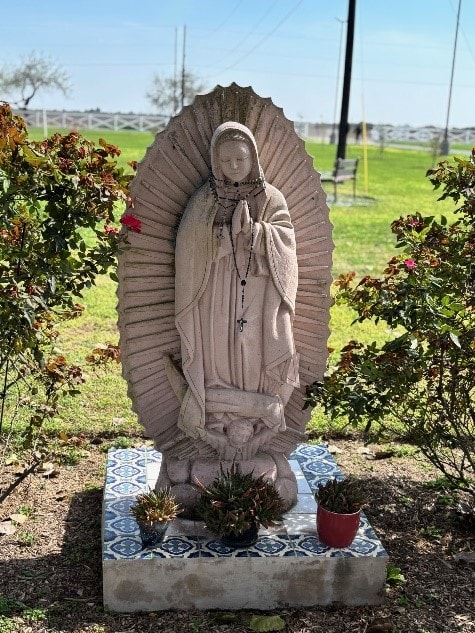
The sisters have also continued their weekly visits to Casa del Migrantes in Reynosa, Mexico. Although there are fewer migrants because of the increase in deportations, the Jesuits still provide weekly liturgies for all the residents and the sisters provide creative activities for everyone to participate in after the liturgy. The three of us have a much greater appreciation for all the work that goes into preparing those activities! They are real recreational therapists, putting smiles on the faces of both children and adults. Our community in McAllen, together with the Jesuits, contribute monthly to another shelter in Reynosa, Senda de Vida Dos, (Path of Life Two). Pastor Miguel and his wife, Angela, who oversee the shelter, use this money to buy supplies at Sam’s Club for the residents. One of us was able to accompany Sister Rose, Pastor Miguel and Angela on their February shopping trip.
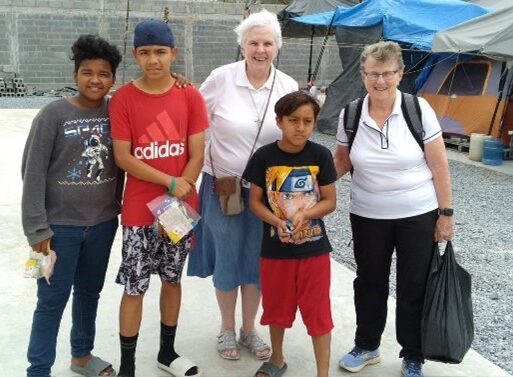
While the outreach ministries have had to shift, the ministry of community and companioning one another as sisters has not changed. Their ministry of hospitality was deeply felt and appreciated by each of us. They are willing to share stories they have heard from the migrants in Spanish, with those of us not fluent in Spanish. Hearing these stories from our women who have heard them firsthand has been a real gift. Their commitment to collaborate with the other sisters and priests in the area is stronger than ever. The ministry of prayer is always evident, even standing on the bank of the Rio Grande each week praying not only for the safety of those migrants making the dangerous crossing but also for the Border Patrol officers that they may do their job with respect and compassion.
It has been said that it may not be possible to change the direction of the wind, but we can learn to adjust our sails! As our sisters here continue adjusting their sails, may all of us, sisters, associates and friends of the OSP and IHM congregations pray with and for them as they respond to God’s call to minister to the most vulnerable at the U.S.- Mexico border.
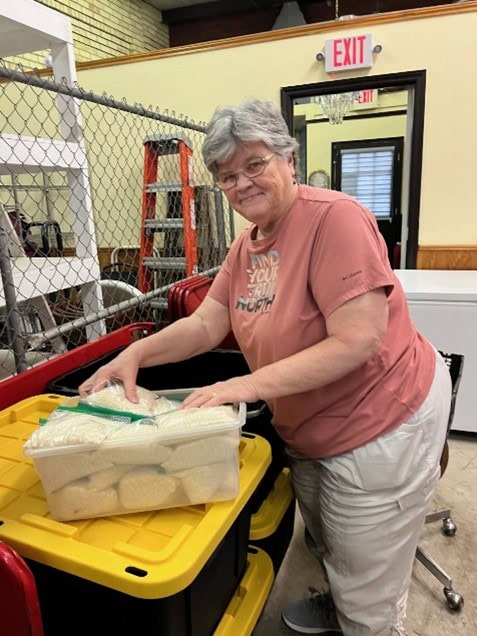
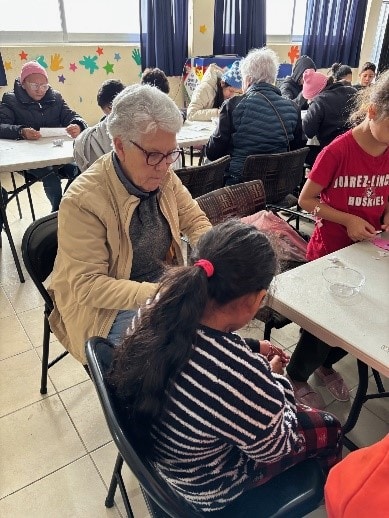
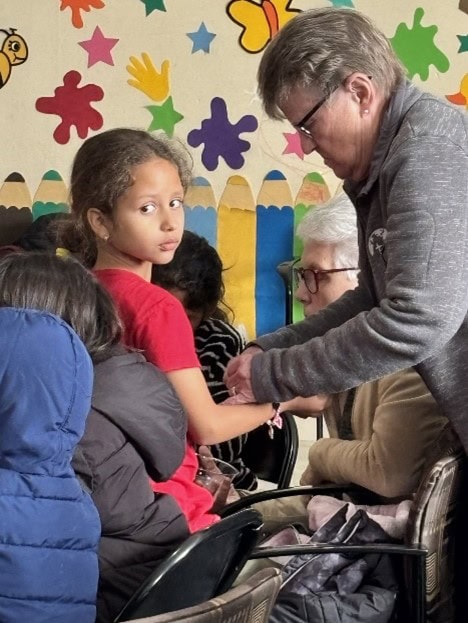
January 2025
What are we seeing? What does it mean? … What now?
By Mary Elaine Anderson, IHM, Carmen Armenta Lara, IHM, Rose Patrice Kuhn, IHM
Since Jan. 20, we have received emails, texts, and phone calls from many, asking us, “What are you seeing at the border?” Here in McAllen, Texas, we are seeing fewer migrants at the Humanitarian Respite Center (HRC). During the year 2024, sometimes there were 50-120 migrants in HRC on any given day (a sharp decrease from the 800 persons that were assisted daily by Catholic Charities in Fall 2023). In the past week, each day that we visited HRC there were about 10-15 migrants.
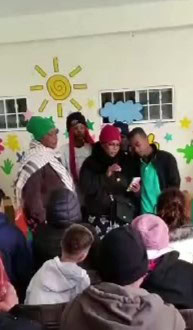
Migrante, Reynosa, Mexico
There are probably some who would see the decrease in numbers as a victory … a halting of “illegal” migrants … a sign that the government is keeping “criminals” from entering the U.S. at our southern border. However, those of us who live at the border and volunteer at the Humanitarian Respite Center understand the decrease in numbers and its implications for migrants in a very different way.
The decrease in migrants at HRC is largely due to the executive order that terminated the CBP-One app. Since Jan. 2023, the app functioned as the legal way for migrants to submit advance information and schedule appointments at eight southern border points of entry. The process often involved a long wait (9-12 months), but it allowed migrants to enter the U.S. legally and to apply for a work permit as well as asylum (protection from violence, poverty or persecution). The executive order Jan. 20, which terminated the CBP One App and canceled existing appointments at the border, has left migrants with no legal way to enter the U.S.
When we visited the Casa del Migrante in Reynosa, Mexico, Thursday, Jan. 23, we found migrants, especially those who had appointments and were scheduled to cross the border that day or week, in shock, confused about their options and unsure of their future. Many of those remaining in Mexico cannot return to their countries of origin because of the threats and the violence that they and/or their families suffered. They are asking themselves, one another and us: “What now?” That day, we did what we usually do on any other Thursday in the Casa del Migrante. We listened to heartbreaking stories and allowed our own hearts to break open. We celebrated the Eucharist … the breaking of bread among families from many different countries … united by their faith in God. After communion, several Haitian women stood up and sang with full hearts and one voice, “How Great Thou Art.” Their strength in the face of so many adversities, past and present, will stay with us as we, too, navigate the current situation at the border.
As the days pass, we begin to explore what direction our ministry at the border will take. Will we be spending more time in Reynosa, Mexico, where migrants, with no legal option for entering the U.S., need accompaniment? Will the Casa del Migrante, where we have been spending every Thursday, become a sanctuary for deportees to Mexico instead of the safe space it was for migrants waiting to receive an interview with Immigration to enter the U.S.? Will the decreased numbers at HRC allow us to meet the needs of migrants in a more personal way?
What is God’s invitation to us now? Just like our migrant brothers and sisters, we will wait, discern our next steps, and move forward with faith in God’s unconditional love for all, especially the most vulnerable and the marginalized. We ask you, sisters, associates and friends of the OSP and IHM congregations to pray with and for us as we respond to God’s call at the U.S.-Mexico border.
December 2024
“We are making the body of Christ with our presence with the migrants.”
by Lisandra Pedraza Burgos, IHM and Ann Oestreich, IHM
(Members of Monroe IHM Leadership Team)

“I am joyful and grateful. At McAllen, I found what God wanted from me. We are making the body of Christ with our presence with the migrants.” With these words, Carmen Armenta Lara, IHM, one of our sisters at this OSP – IHM Ministry at the Border, described her profound experience. Before this ministry, she wondered if God had exploded and dissipated into millions of particles that impeded her finding Him/Her. It was in the context of encounters with the migrants that Carmen realized that all the particles interrelate, interconnect, and become one. It was in the faces of the migrants that she recognized the face of God, of the God of Love that called her to serve.
After briefly sharing the life and ministry of this community, we understand, somehow, the deep meaning of Carmen’s metaphor. The encounter with the families from Venezuela, Colombia, Haiti, Honduras, Nicaragua, Mexico, and Cuba offers opportunities to see with new eyes, feel with a new heart, and demystify the other that has been constructed. Constructing “the other” is an ancient, powerful strategy to categorize people, induce fear by demonizing them, undermine their credibility and access to basic human rights, and share power in society. Our hearts are transformed when we look into their eyes, affirm their humanity, and listen to their silences, stories, hopes, and dreams.
By opening ourselves to heart encounters and relationships, we see each person who comes to the USA as a sister or a brother, created and loved by God. We see their suffering and understand that the decision to leave their home countries is influenced by complex circumstances that force them to take incredibly high risks that jeopardize their safety and lives in the hope of a more fulfilling life.
To be part of the OSP – IHM Ministry at the Border and volunteering at the Catholic Charities RGV Humanitarian Respite Center and at the Casa del Migrante in Reynosa, Mexico, has been a blessing. Like Carmen, we recognized the faces of God in the people who came there. The experience of encounters with these women, men, and children will live in our hearts forever. We are mindful that although their journeys include great danger, uncertainties, and fears, they cling to their deep faith in God and the kindness of others.
We continue to value our prophetic presence of our OSP/IHM community with the most marginalized and excluded, and to reflect on its impact on the present and future of religious life. We experienced the power of hope over despair, love over hate, and peace over all types of violence. Thank you, McAllen community, for your gifts and for being an inspiration for the thousands of migrants you have touched, as well as for our congregations and the global community. May you, and all of us in religious life, continue walking with God’s people and loving them as God loves them. After all, this is the essence of our call: to let the World know that each and all are loved unconditionally.
October 2024
What do these migrants have in common? Of the 200 migrants at this shelter in Reynosa, Mexico, 78% have been kidnapped.
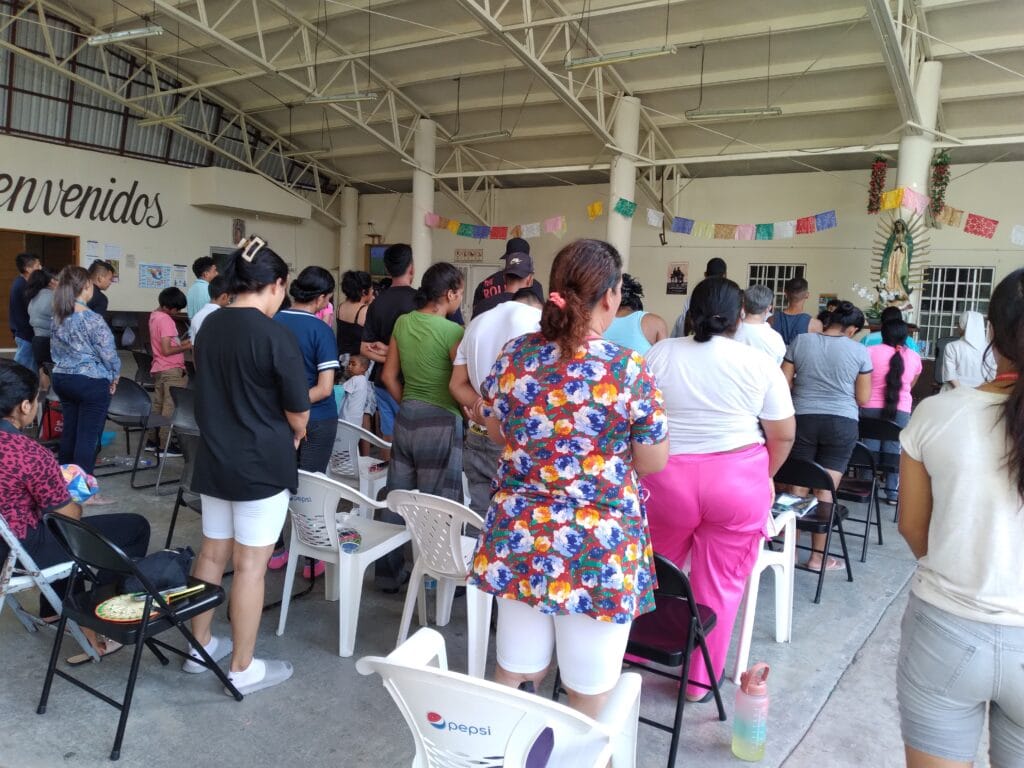
“The Church is a Field Hospital” is a recurring theme of Pope Francis. Here at the US/Mexico border, these words invoke images of our migrants fleeing from one war zone of poverty and violence in their country of origin into another war zone at our border. We hear each day of kidnappings by the cartel in Reynosa, Mexico, where we minister at two shelters. We hear personal stories of physical, mental and sexual cruelty during days and months of being held ransom. The violence and inhumanity are too horrible to describe in detail!
“The Church is a Field Hospital.” How do we minister to children who share: “I was kidnapped two times.” “They took everything; I have only these clothes.” “I have no life.” “I am scared.” “I have nothing.” “Am I safe?”
“The Church is a Field Hospital.” We talk among ourselves and others who serve at the border about how we can change the situation in Reynosa, but we have no answers. We don’t know how to end this war. What we can do is accompany the migrants in the Field Hospital shelters to try and help heal the wounds of the heart. We do what we can to release stress, anxiety and fear by praying with our migrants, listening to them, walking with them and letting them know how precious they are.
Thank you for your continued prayerful support. We are blessed!
September 2024
A Small Project with Big Benefits
by Sister Candyce Rekart, IHM
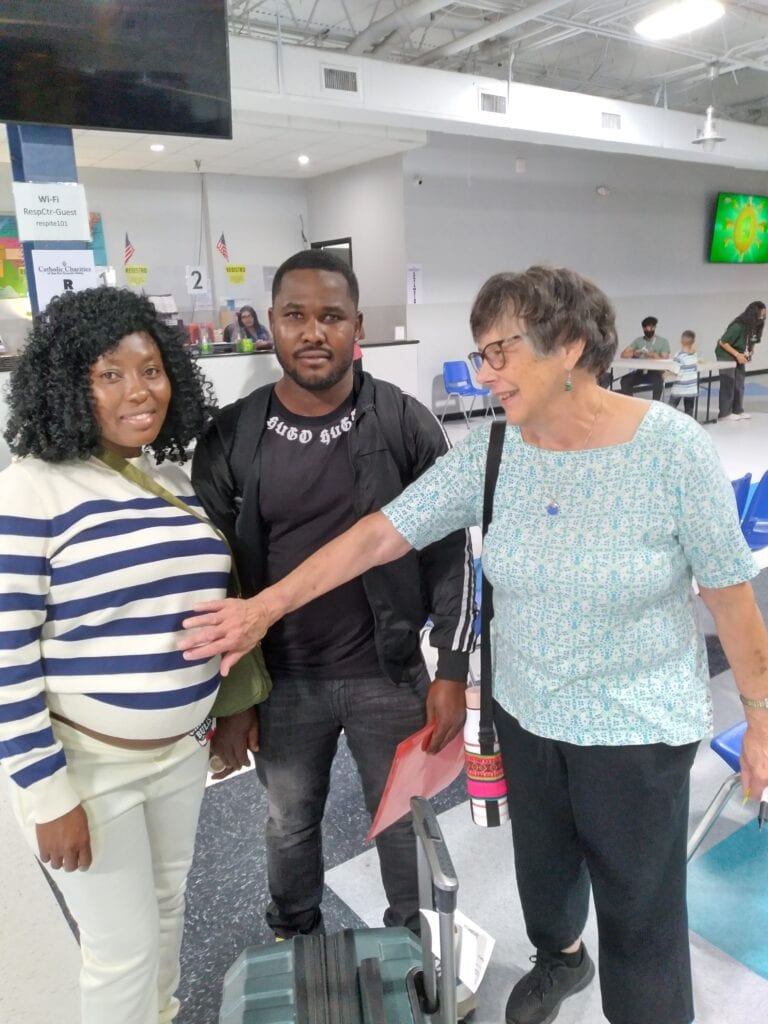
My time in McAllen, Texas, with the IHM inter-congregational community and the mission to migrants on the border, was marked by many noteworthy events. Sisters Mary Elaine Anderson, IHM Scranton, Rose Patrice Kuhn, IHM Immaculata, and Carmen Armenta Lara, IHM Monroe, open their home and offer an opportunity to join them in their ministry with migrants on the border between McAllen, TX, and Reynosa, MX. One of the outstanding, practical, concrete images I have is of their project with the people waiting in the shelter in Reynosa, Mexico.
Imagine the long hours of waiting for paperwork, appointments, and connections, which sometimes take months. Imagine long hours in the heat. When I was there, it was 104 degrees Fahrenheit. There is little to do for children, expectant mothers, anxious fathers, and teens, but wait. Time on their hands is just another of the challenges of their long journey, a journey that has been hard, sometimes precarious, and often traumatic.
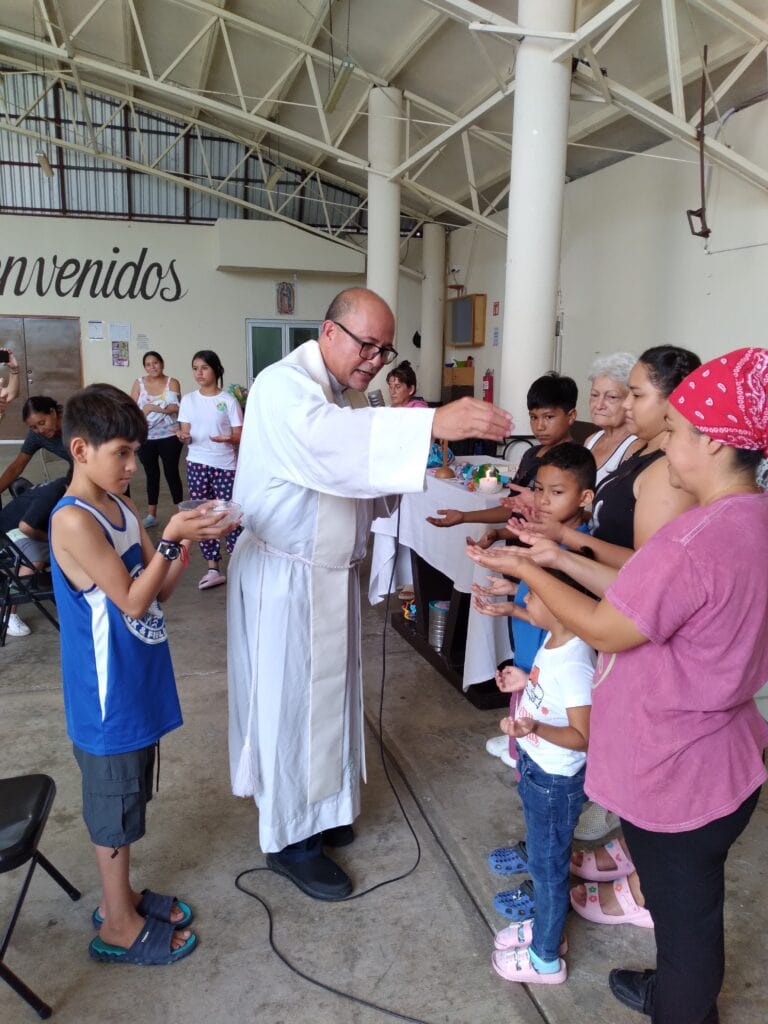
So, among the other activities they do in the shelter, these IHM Sisters created a project, seemingly small but with big benefits. This project entails using various colors of yarn, a needle, and plastic shapes. I saw migrants working enthusiastically. Adults and young people engaged in a project not only for their hands but also to engage their minds and energy. They productively channel tension and frustration, inspiring creativity and focusing on their abilities to create something beautiful, as well as promoting socialization as they share their designs and chat. Crafters placed handcrafts on the altar at a Mass we attended in the shelter. The blessing of hands followed. What a beautiful moment to see the joy on their faces and celebrate these accomplishments!
What a project! What a sense of empowerment!
Gracias, McAllen IHM Community, for your commitment to the border and making this project possible, among the many other things you do to benefit migrant families and those invited to work with you.
August 2024
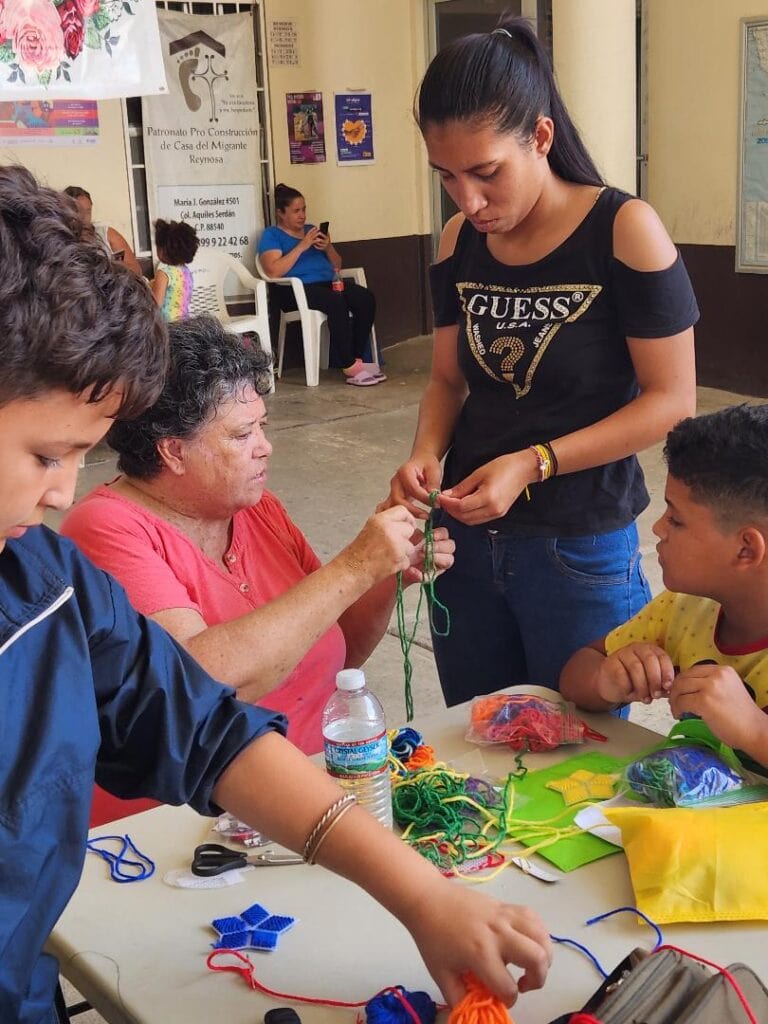
In May, the OSP-IHM Collaborative Border Mission received a grant from the National Leadership Conference of Women Religious (LCWR) and its partner, the Asociación de Hermanas Latinas Misioneras en America (AHLMA). The funded project addresses the mental health issues of migrant women and their families living in the Casa de Migrantes in Reynosa, Mexico, and waiting to receive their interviews with Immigration.
In June, the first phase of the project was initiated. Volunteers began to provide weekly arts & crafts, needlework and baking classes for women and their children. The classes have been received with great enthusiasm, and there are already a few success stories. This year, instead of buying cakes to celebrate Father’s Day, the baking class made about two hundred cupcakes, put them together to form two rectangular cakes, and decorated them. Sister Carmen Armenta Lara (Monroe IHM) has also successfully gathered a group of women and teens to teach them how to make articles (ornaments, mug rugs, etc.) from plastic canvas. When we arrive each Thursday, it is exciting to see small groups of Carmen’s students sitting together, talking, laughing, helping one another, and creating their own designs with the plastic canvas.
The project’s second phase was implemented by the first week of July. Using money from donors who already support our ministry at the border, we began to buy the handmade items created by the migrant women and teens. Each person took great pride in their work. We believe that the stipend they received for their time and labor is one small step in restoring their sense of dignity and agency.
When we wrote the grant, we hoped to send the handmade crafts, explaining the project, to the retirement/nursing homes of the OSP and IHM congregations to be displayed in their gift shops. That hope has become a reality! Sisters Carmen Armenta Lara, Rose Patrice Kuhn, and I have delivered the items in person to the three IHM Congregations. May each hand-crafted article be a reminder of the plight and the potential of migrant women and teens and an invitation to strengthen your prayerful support of them!
July 2024

When you minister at the U.S.-Mexico border, you realize that everything happens in collaboration, not isolation. Every encounter you have holds the potential to create a network of relationships that works in favor of and for the well-being of our migrant brothers and sisters.
We, IHM Sisters living in McAllen, Texas, value the many relationships we have made over the past two years. First and foremost, we are grateful for the opportunity to live intercongregationally and interculturally with IHM Sisters from Monroe, Immaculata and Scranton. It also has been a privilege to welcome sisters from each of the IHM congregations and to accompany them as they volunteered briefly at the border. On June 16, we joyfully received our first Oblate Sister of Providence volunteer, Sister Mary Pauline Tamakloe, OSP. We can only imagine the smiles of Mother Mary Lang and Mother Theresa Maxis as they saw their sisters come together to offer compassionate and loving care to the world’s vulnerable and marginalized.
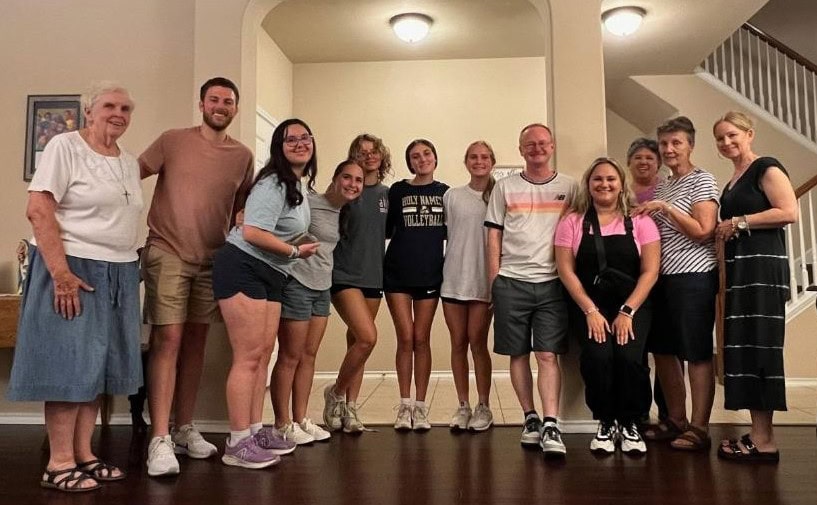
Part of our ministry also is to welcome groups of students who come to the border to give service. In June, we connected with three different groups of students who spent one week at the ARISE summer camp for immigrant children in the Rio Grande Valley. The first group was Marywood University, who arrived during the first week of June. This was not Marywood’s first time at ARISE. Lea Dougherty has brought students to the Rio Grande Valley for several years. Marywood’s continued presence has impacted the children and youth at ARISE, especially one young man named Juan. Juan has a dream to study social work at Marywood University.
During the second week of June, students from the Academy of the Holy Names, Tampa, Florida, where Sister Lisa Perkowski (Scranton IHM) ministers, arrived to volunteer at one of the ARISE campsites. This was the second time AHN students came to McAllen, and they joined us one evening for dinner and conversation. The students were delightful and spoke with sincerity and depth about their experience volunteering at the border.

The Cristo Rey students from Detroit, Michigan, are the third group with whom we connected. Their chaperone, Kim Redigan, volunteered with us for two weeks in June 2023. During that time, she networked with ARISE personnel and investigated the possibility of bringing her students to work at an ARISE camp the following year. After a year of fundraising and preparation, Kim carried through with her plans this June. Many of the Cristo Rey students were Spanish-speaking, and all of them brought energy to their volunteer service.
Who knows where all these relationships we have made might lead? Only time will tell. Meanwhile, let us continue to value every encounter that comes our way!
May 2024
Too much to bear
By Sister Joyce C. Bell, IHM
Social Justice Coordinator, Immaculata
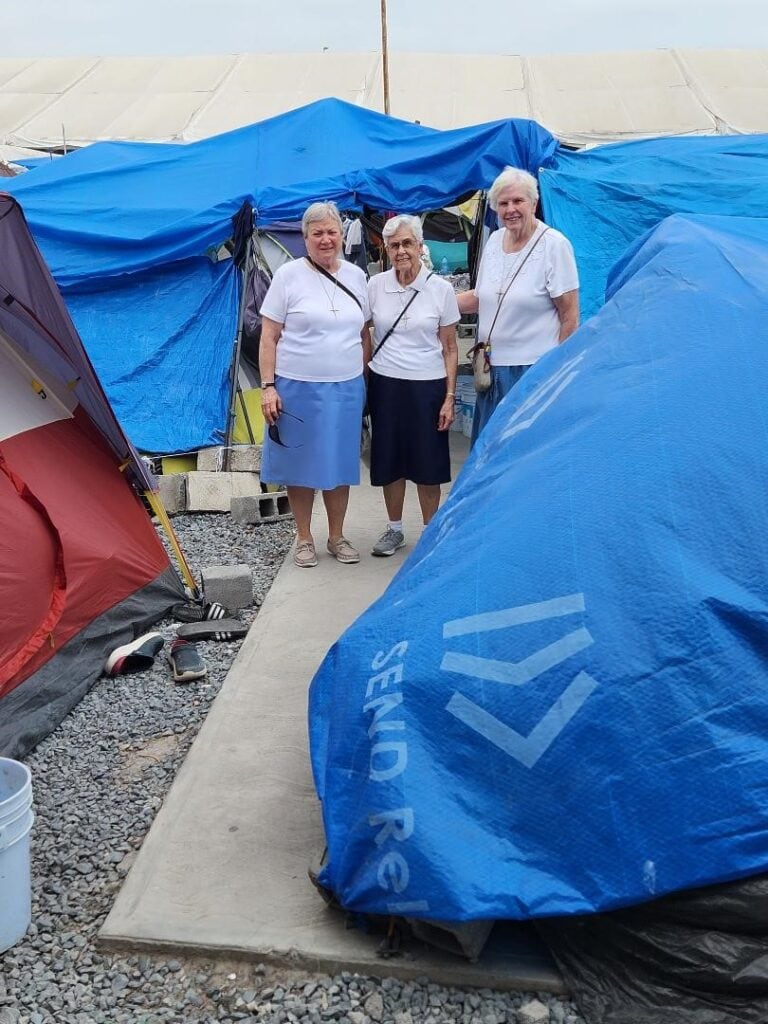
Social Justice is Gospel living through actions that embody Catholic Social Teaching principles. As I crossed the border from Reynosa, Mexico, to McAllen, Texas, I was struck by the number of migrant families camped along the bridge that crosses the Rio Grande, a thin strand of humanity clinging to the hope that they will be received as asylees into our country. Who were they? Why were they there? How long had they been there? The weather every day in McAllen in late April was overcast and humid, and it was in the 90s. It was not the weather you wanted to be standing or sitting in for long. Mothers and fathers, small children and infants were all there. Even the Sisters who serve in McAllen had no explanation, only conjectures, as to why these people had gathered and were waiting for who knows how long. Meanwhile, the queue of people crossing the border stopped and started but eventually reached the American side. Sister Lauretta Linsalata and I were volunteering at our collaborative ministry, Mary Comfort of Migrants, in McAllen. In our eleven-day ministry here, we met hundreds of people waiting, hoping. They were gracious and cared for, but the burning question in my mind was, “How did we ever come to this?”
In 1980, the United States Congress created the Refugee Act. It has formed the basis for asylum in our country. Asylum seekers must be in the U.S. or at a port of entry to request the opportunity to apply for asylum. Since 2016, the U.S. Government has severely restricted access to asylum at the border. The “Remain in Mexico Policy” impacted more than 75,00 asylum seekers. Title 42 sent nearly 3 million migrants back to Mexico. At the end of Title 42, May 11, 2023, President Biden implemented the “Asylum Ban” on May 12, 2023. This ban requires migrants to seek asylum in whatever country they pass through to the southern U.S. border. If they are denied, they may request it here. How would the migrants trekking through the jungles and the Darien Gap even know about this policy? If they make it to the border, they have to secure a limited appointment time through an App on a smartphone called CBP One. This policy turns asylum protection into a lottery system, leaving the protection of vulnerable people to chance while many remain in dangerous conditions. *

As a Catholic, it becomes difficult to justify everything I see when my faith believes in the dignity of the human person, the importance and protection of family life, the right to live in a society that promotes the common good and the well-being of all, especially the poor and vulnerable. One answer is to support the religious nonprofits that are providing the basic necessities to the migrants while they wait for a more just and humane policy. A second answer is to become a voice for the voiceless, to advocate for changes in immigration policies that align more consistently with the best of who we are as Americans and with our beliefs as Catholics.
*The International Rescue Committee is the source of all factual information.
April 2024
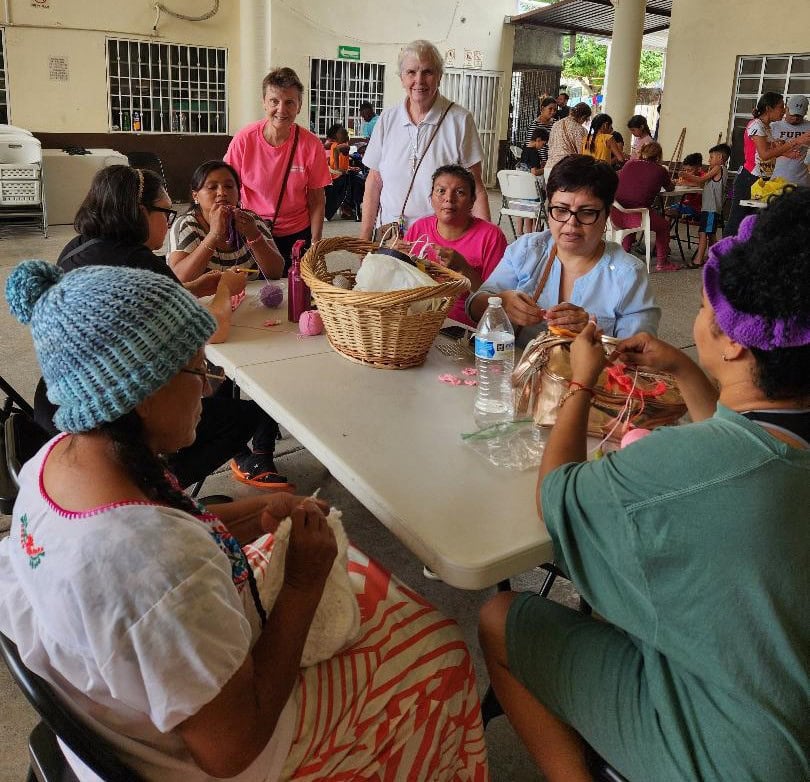
are learning to crochet and knit.
The OSP-IHM Border Mission “Mary, Comfort of Migrants” would like to express its gratitude to the National Leadership Conference of Women Religious (LCWR) and its partner, the Asociación de Hermanas Latinas Misioneras en America (AHLMA) for their recent grant of $3,350. The awarded money is part of the LCWR Solidarity Collection, which was implemented to address the needs of LCWR Region 12 (Texas, Arkansas, New Mexico and Arizona).
The grant addresses the mental health issues of migrant women living in the Casa de Migrantes in Reynosa, Mexico. The Daughters of Charity sponsor the shelter, which provides lodging and food for about 200 migrants, many of whom are women and children. While volunteer healthcare workers attend to the medical needs of the migrants and Jesuit and Redemptorist brothers and priests nurture their spiritual lives, mental health is an area that has not been directly addressed.
Migrants usually spend 2-6 months in the shelter while they apply and wait for their interview with U.S. Immigration. The extended period of waiting, unoccupied hours and lack of daily purpose have exacerbated the mental health issues of women who suffer from PTSD, anxiety, depression and low self-esteem.
The proposed project integrates body-centered activities with creating handmade crafts and homemade baked goods. Lay and Sister volunteers give weekly arts & crafts, needlework, or baking classes to the women. At the beginning of each class, body-centered and movement activities are incorporated to help the women center and ground themselves and manage their anxiety and depression. During the class, women learn a skill they can adapt for future use. They are given materials to continue practicing the learned skill during the week. Each class ends with a self-care activity that soothes and calms the women.
The project’s second phase involves using money from donors who already support our ministry at the border to buy handmade items created by migrant women. This potentially would give the women a sense of agency and purpose, increase their self-esteem, and provide them with money to use for their personal and family needs. We hope to send the handmade crafts, with an explanation of the project, to the retirement/nursing homes of the OSP and IHM congregations to be sold in their gift shops to raise awareness of the plight and the potential of the migrant women and strengthen the prayerful support of our aging sisters.
March 2024
Celebrating Holy Week with our migrant brothers and sisters
What a profound experience and blessing to walk with migrants during Holy Week! Our migrant brothers and sisters truly incarnate the Passion, Death, and Resurrection of Jesus in our present-day world. This year, we (Carmen, Elvia, Rose, and Mary Elaine) accompanied Brian Strassburger, SJ, to Senda de Vida 2, a migrant encampment on the outskirts of Reynosa, Mexico, for the celebration of Holy Thursday, Good Friday, and the Easter Vigil.
Last year we celebrated Holy Week in Casa de Migrantes, a shelter run by the Daughters of Charity in Reynosa, Mexico. There we met Jesuit priest Alejandro Olaya-Mendez who is an assistant professor in the School of Social Work at Boston College. Alejandro was so touched by his experience of Holy Week last year that he returned to celebrate with the migrants this year. We invite you to listen to the podcast in which Alejandro reflects on his experience and the meaning of the Holy Week celebrations in the migrant context. Click here to access the podcast.
Our migrant brothers and sisters truly incarnate the Passion, Death, and Resurrection of Jesus in our present-day world.
Sister Mary Elaine Anderson
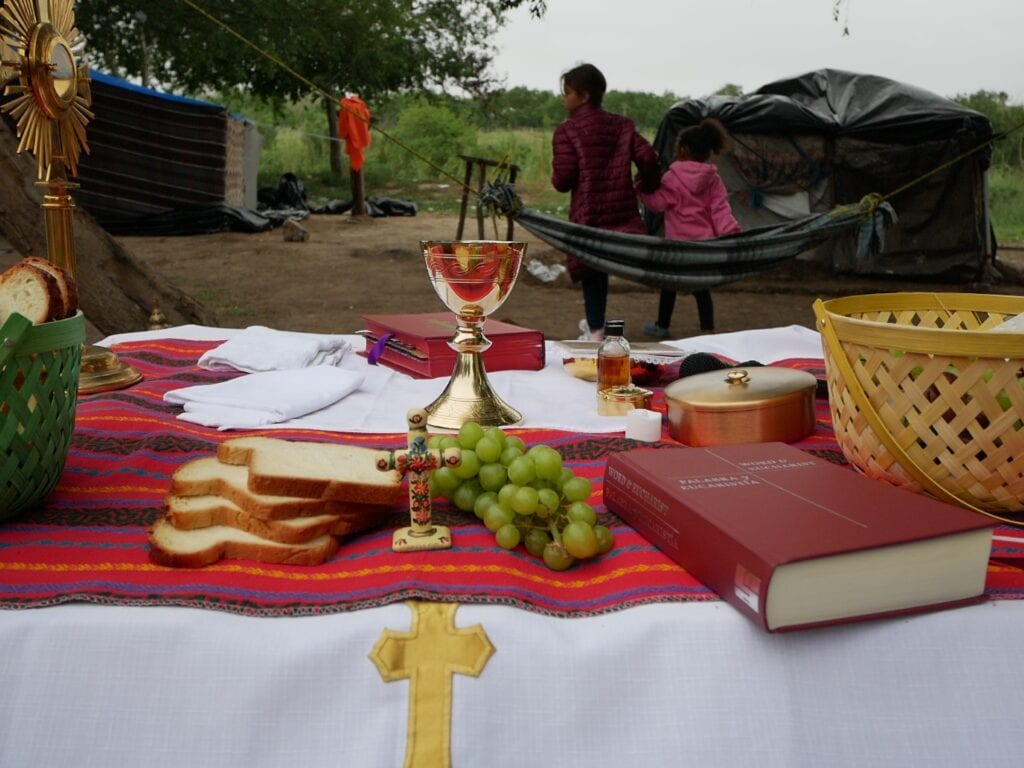
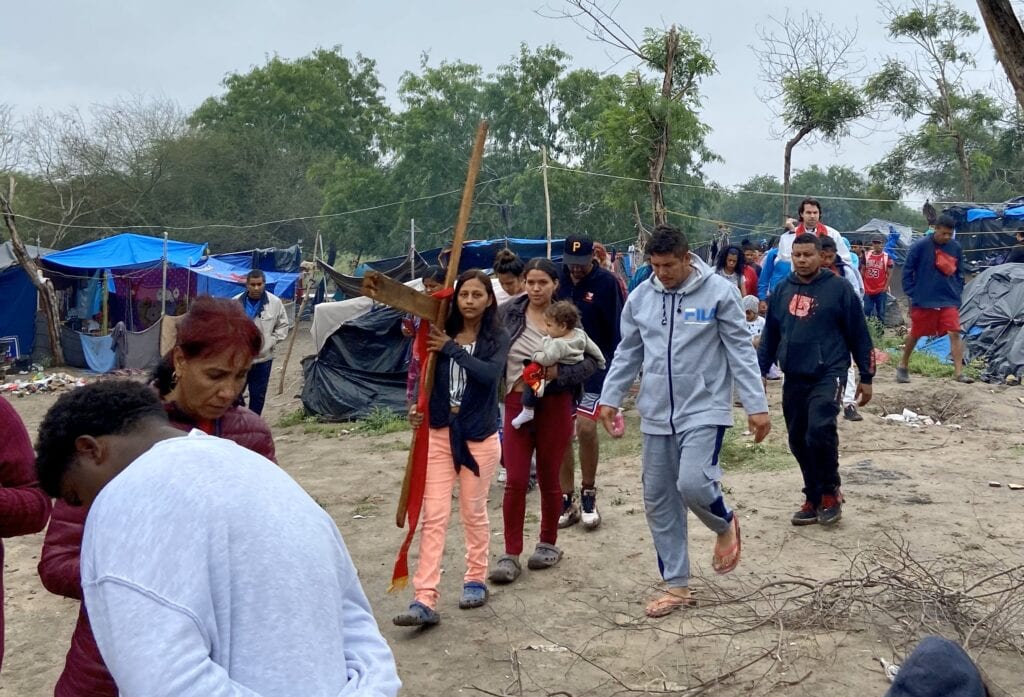
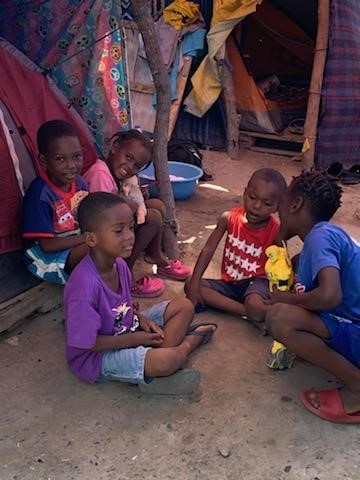
January 2024
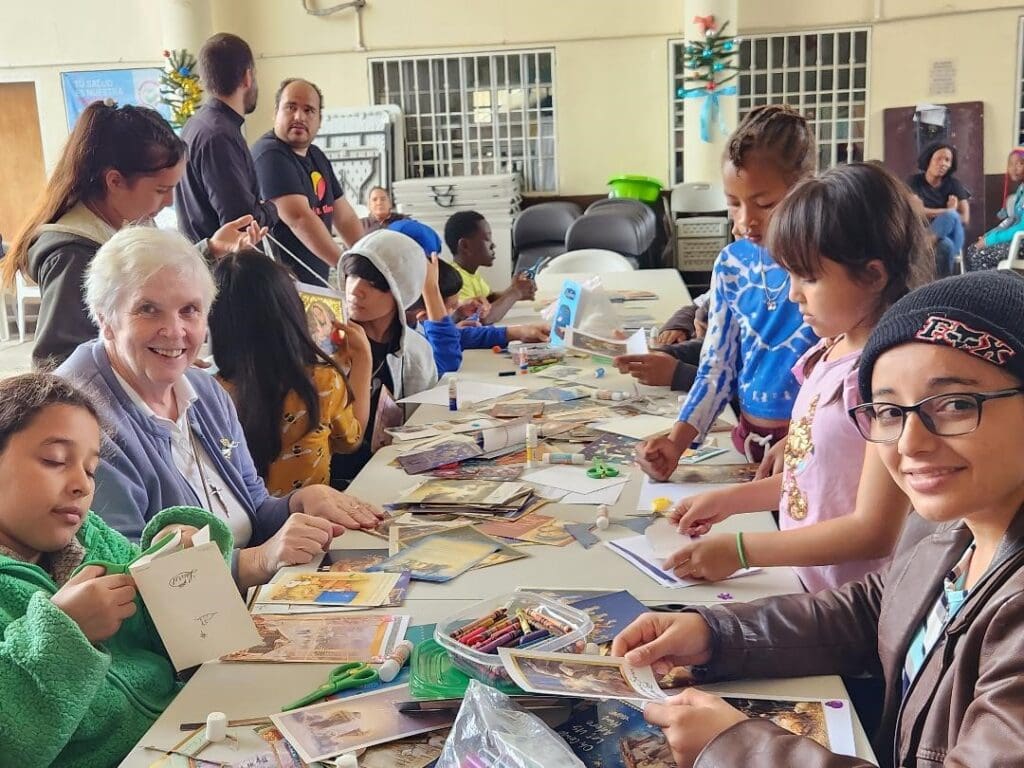
Recent news reports about the U.S.-Mexico border and the increase of migrants crossing the border may have some of you wondering about our commitment to welcoming asylum seekers to the U.S. A few might be asking if our ministry at the border is legal and if we are serving “illegal” immigrants. Carmen, Elvia, Rose, and I would like to reassure you that our ministry is not only legal but a necessary and loving humanitarian response to the plight of migrants fleeing violence, oppression, unemployment, and hunger in their countries of origin.
You also probably have read or heard that US border towns are overrun with migrants wandering the streets. In McAllen, Texas, that is not true, primarily due to the work of staff and volunteers at the Humanitarian Respite Center (HRC), which Catholic Charities of the Diocese of Brownsville sponsors. Migrants at HRC, where we volunteer four or more days a week, have either crossed the border with the CBP One app, which allows them to request an interview with immigration at a port of entry and start the asylum process, or they have handed themselves over to Immigration on the bridge or U.S. soil to request asylum. All migrants at HRC have documents from Immigration and a date to attend immigration court in a city near where their sponsors live.
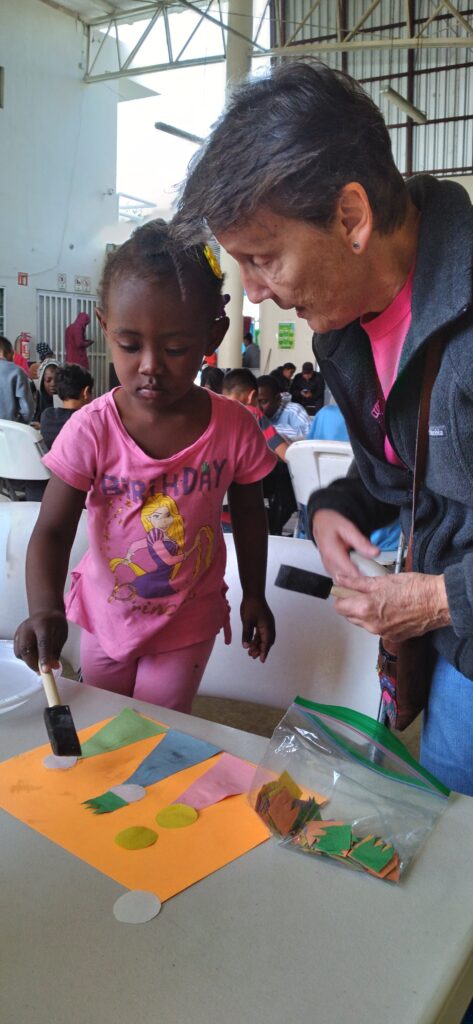
In Reynosa, Mexico, we join Franciscan and Mercy sisters and Jesuit priests to minister to migrant families living in the Casa del Migrante, a shelter sponsored by the Daughters of Charity. We encourage the migrants waiting to cross the border to use the CBP One app, even though it may take months to get an interview with Immigration at the Hidalgo Bridge. The families at the Casa del Migrante have food, shelter, and access to physical and mental health care. Although about 80% of them were assaulted and/or kidnapped in Reynosa or during their journey to the border, they are safe within the walls of the Casa del Migrante. A more extended stay at the Casa del Migrante means there is time to create community among migrant families, give spiritual and emotional support to adults, and teach children through art and games basic skills that they will need when they finally can attend school.
In contrast, Senda de Vida 2 is an encampment that, at times, has held almost 3,000 migrants. There is not enough food to feed everyone there, so we have used some of our donations to help address the food scarcity. When we visit migrants in Senda 2, we bring a listening ear and a loving heart. Many migrants in Senda 2, as well as those living on the streets of Reynosa, lose hope that they will ever receive an appointment with Immigration using the CBP One app. The fear of being kidnapped, robbed, or physically harmed while waiting compels them to hand themselves over to Immigration.
So … what is happening regarding the number of migrants crossing the border? We can only share with you what we have seen. Like many of you, we too wonder what is behind the increase or decrease of migrants crossing the border at any given time of the year. We have been here long enough to know that the population of migrants fluctuates, not unlike that of global migration.
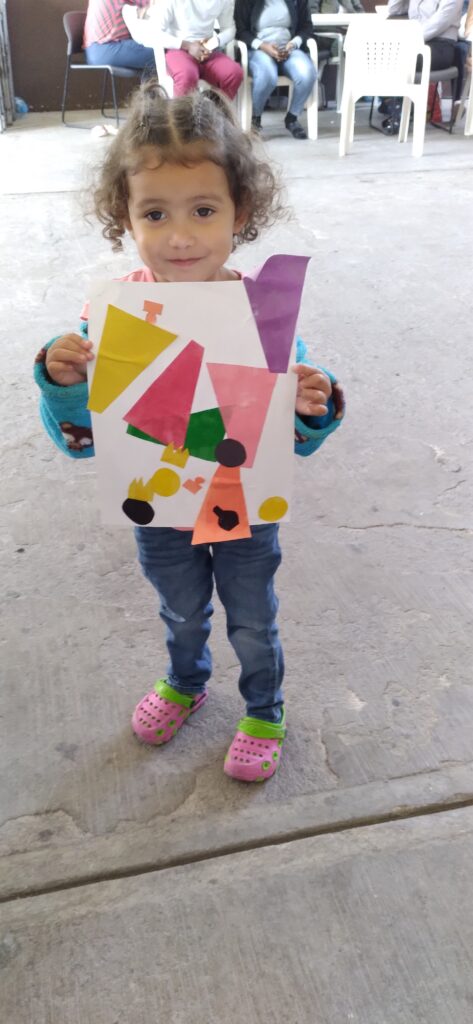
Throughout November and December, there was a surge of migrants crossing the southern border. Since about January 8, that number has decreased, and fewer migrants are arriving daily at the Humanitarian Respite Center in McAllen. When we asked HRC personnel and others who are knowledgeable of immigration policies why a decrease followed an increase in migrants crossing the border, we were given these possible reasons:
- There was an increase in migrants crossing at the end of 2023 because of a concern about possible US policy changes in the new year.
- Cold weather impacts migration, and fewer people cross the border.
- After US and Mexican officials met on December 27 to discuss the large number of migrants crossing into the U.S., Mexico has placed more restrictions on migrants who can cross the bridge and hand themselves into U.S. Immigration.
The fluctuation in numbers has not affected our commitment to asylum seekers. In the name of all IHMs and Oblate Sisters of Providence, we continue to accompany our brothers and sisters waiting in Reynosa and welcome migrants who arrive in McAllen. It was precisely because we desired to serve migrants on both sides of the border that our congregations chose to establish a mission in the Rio Grande Valley of Texas. We thank you for your prayerful and loving support. You inspire us to be a presence of God’s unconditional love at the border.
December 2023
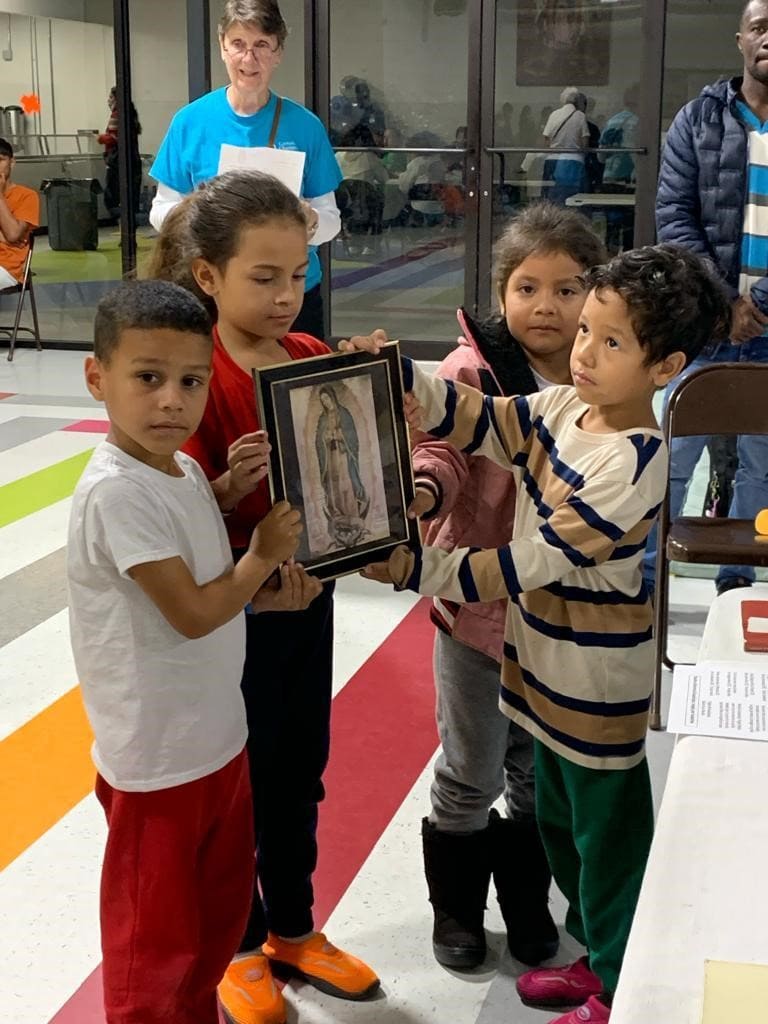
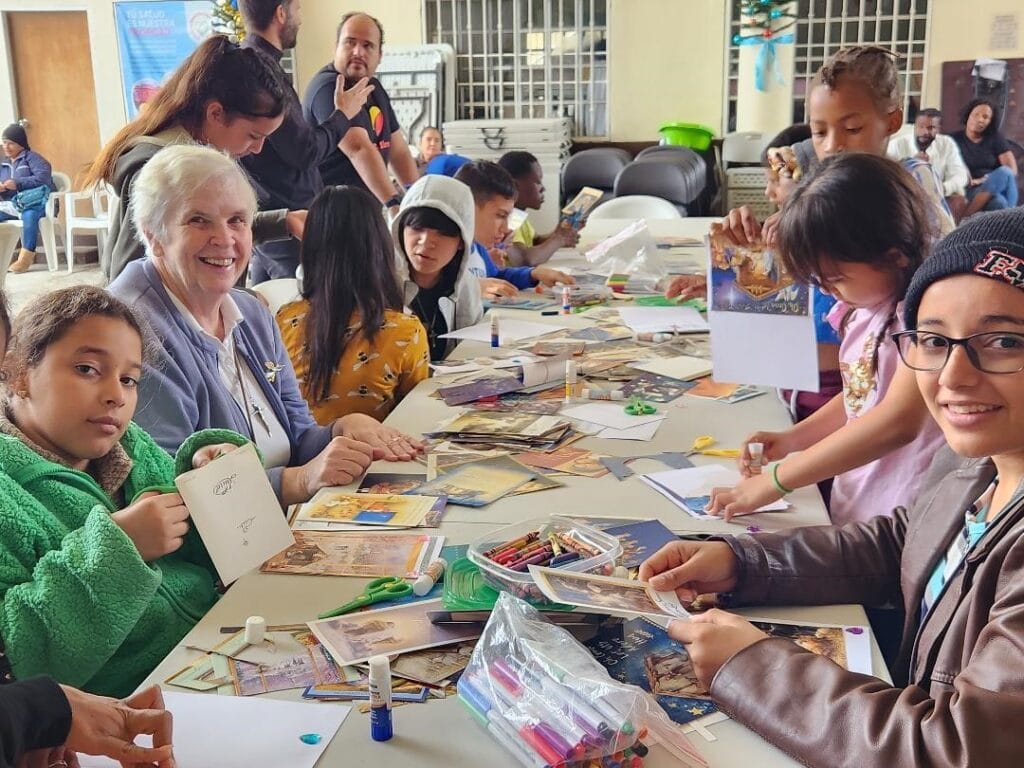
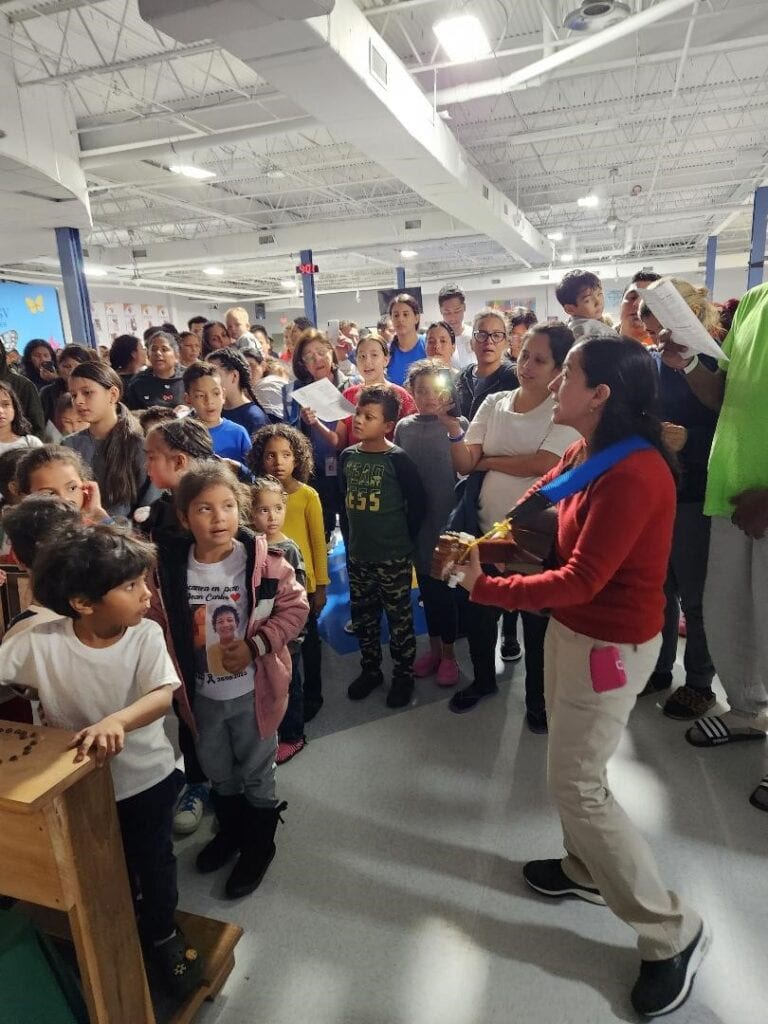
September 2023
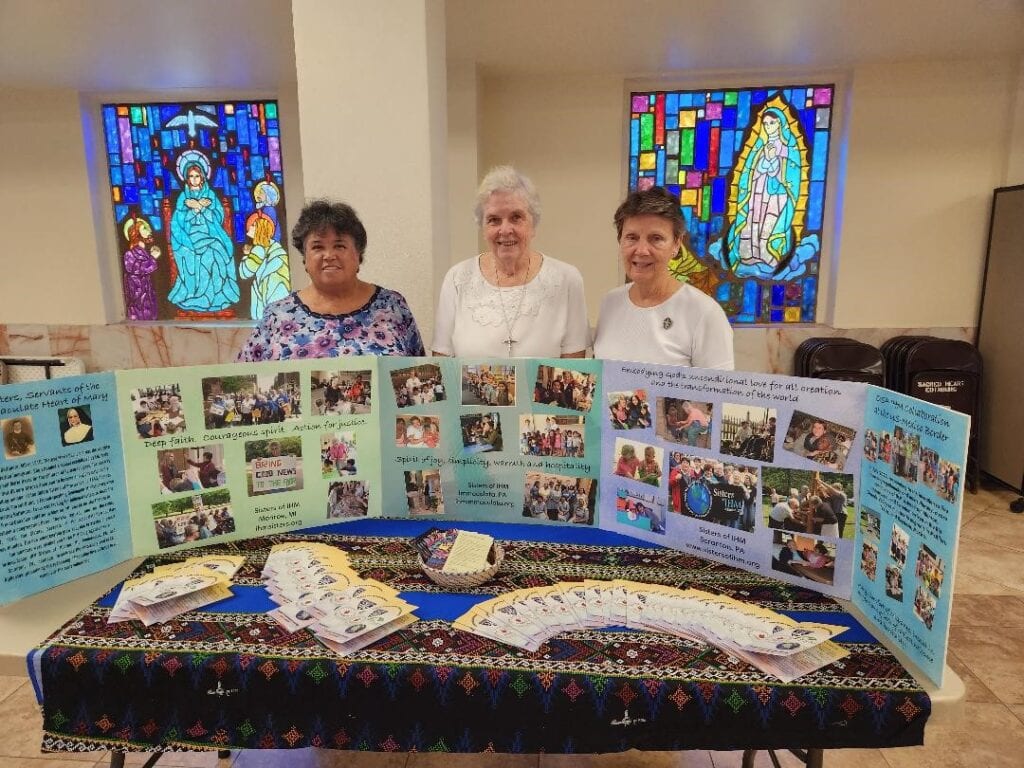
On Sunday, September 24, the feast of Our Lady of Mercy, Sister Terry Saetta, RSM, invited our core community of IHM sisters, living and ministering at the border, to participate in a vocation event at Sacred Heart Parish in Edinburg, Texas. Rather than present three separate stories featuring each of the IHM congregations—Monroe, MI, Immaculata, PA, and Scranton, PA—we chose to weave our stories together in a display of five panels that portray the movement of the Spirit in IHMs from our foundation in 1845 to the present moment.
The first panel focuses on Theresa Maxis, her roots in the Haitian community of Baltimore, her role as a founding member of the Oblate Sisters of Providence, and her response to Redemptorist missionary Louis Florent Gillet’s invitation to found a new congregation of sisters in Monroe, MI. Subsequent panels depict how IHMs today continue to embrace the missionary zeal of St. Alphonsus, proclaiming the redeeming/liberating love of Jesus to all, especially the most vulnerable. The fifth and final panel highlights the collaboration of the OSP and IHM congregations at the US-Mexico border and the invitation to sisters from each of the four congregations to live intercongregationally and interculturally as they accompany migrants in McAllen, Texas, and Reynosa, Mexico.
May Mary, Comfort of Migrants, walk with us along paths of peace and joy!
August 2023
Philadelphia IHM Sisters Linda Filipponi and Joan Rychalsky volunteered to serve migrants in McAllen, Texas and Reynosa, Mexico, from July 22 to Aug. 5, 2023. They lived and worked side by side with the core community of sisters who are part of the OSP-IHM Collaborative Mission and Ministry at the border.
Reflecting on those two weeks, Sister Linda writes:
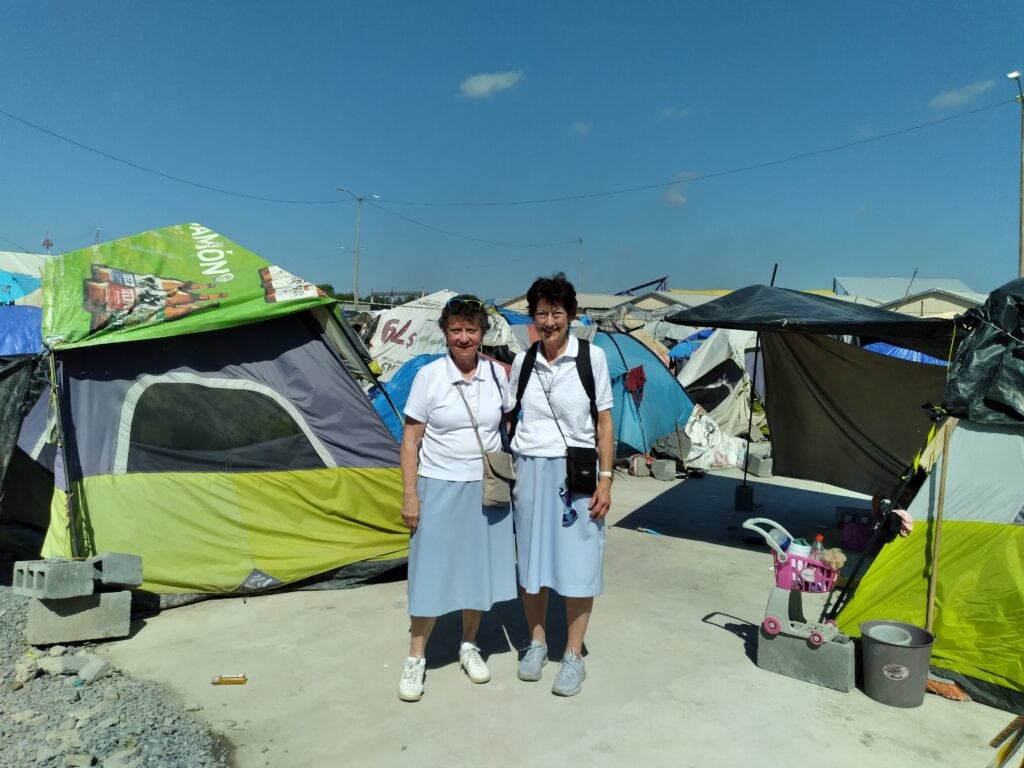
Even beginning to reflect on my experience at the border ushers in a flood of emotions, but I will focus on one image that had its most significant impact on me –the faces of the children. They quickly became and continue to be a meditation for me for many reasons. The remarkable beauty, brightness and depth shone through their eyes and smiles. After all they had been subjected to, I marveled that they could look this beautiful – even as they walked shoelessly around the dirty floors of the Respite Center in Texas and glid their newly crayoned butterflies through the air around the encampment among the tents in Mexico. In their innocence and trust in their parents’ love, and in all of us who cared for them, they knew a sense of security and of being loved. They stirred my soul!
Then, there were the children who looked lonely. On my first visit to the Respite Center, I saw a little girl sitting next to her father, crying as he tried to encourage her to eat the warm meal provided for them. When I walked up to try to console her, her father looked up at me and said, “She misses her mother.” I asked Rose if she had anything that I could give her. She gave me a small, beaded bracelet and I offered it to her, but she remained sad. I wished that there was something more that I could do for her.
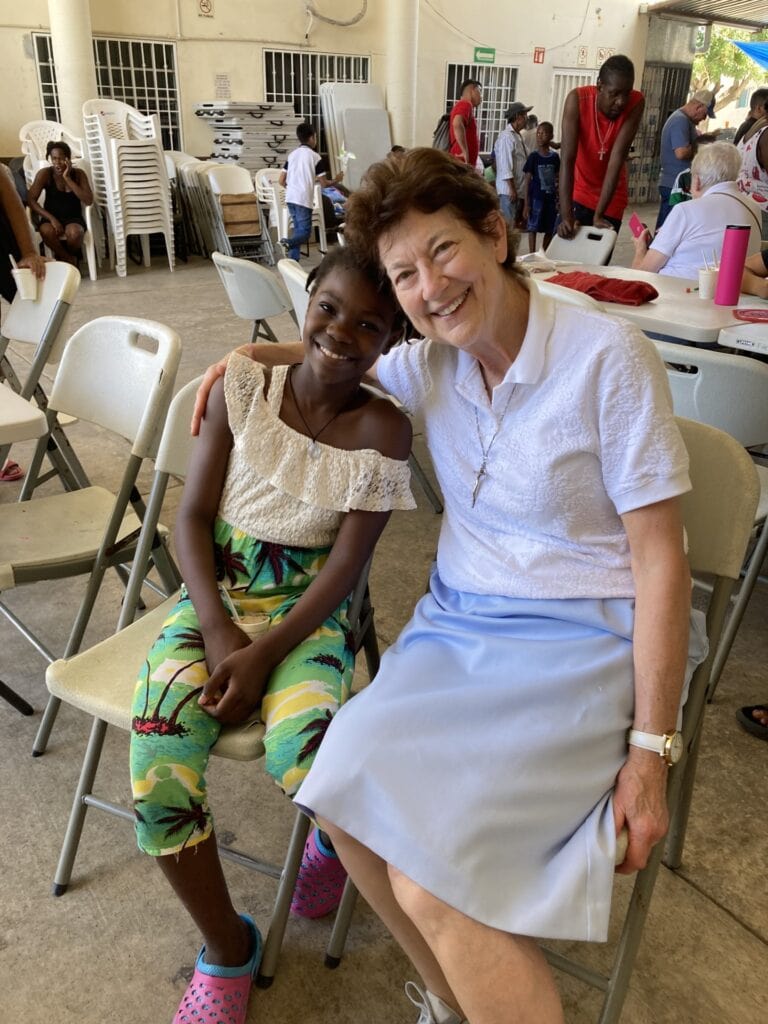
The next day, Joan, Rose, and I went to Omega 99 (Think Dollar Tree!) and bought as many colorful hair ribbons and bows as they had in hopes of brightening the faces of the little girls!
Our desire in Texas had been to bring some small amount of help, joy and hope to the migrants we met there. By clipping hair ribbons on the heads of the little girls, we hoped to help ease some of the trauma they experienced in the most deplorable and dire circumstances. We had hoped to see more smiles on the faces of the children—and their loving parents—and fewer lonely children “missing their mothers.”
Sister Joan says this about her experience at the border:
Even though I was anticipating this trip to Texas to assist in this border ministry in some small way, I could never have imagined the basic reality of the migrants’ situation, the emotional impact of our ministry there and the wonderful blessings of this journey.
The reality of the migrants’ journey is overwhelming and heartbreaking. For those migrants who travel long distances to reach one of the border camps in Mexico, there is not only some relief in arriving at the border but also great anxiety in waiting to see if they will be allowed to cross the border. They could wait anywhere from a few weeks to a year. Their living conditions are challenging at best. Still, the migrants find joy in their families and fellow companions who can share their circumstances, stories, concerns and hopes. The migrants enjoy when the sisters visit the camps because their presence brings hope, kindness, compassion, empathy and periodic activities and crafts for the children. If and when the migrants receive permission to enter the U.S., staff and volunteers at the Humanitarian Respite Center endeavor to meet their physical, emotional and spiritual needs. They help them get in touch with their sponsors and arrange their travel.
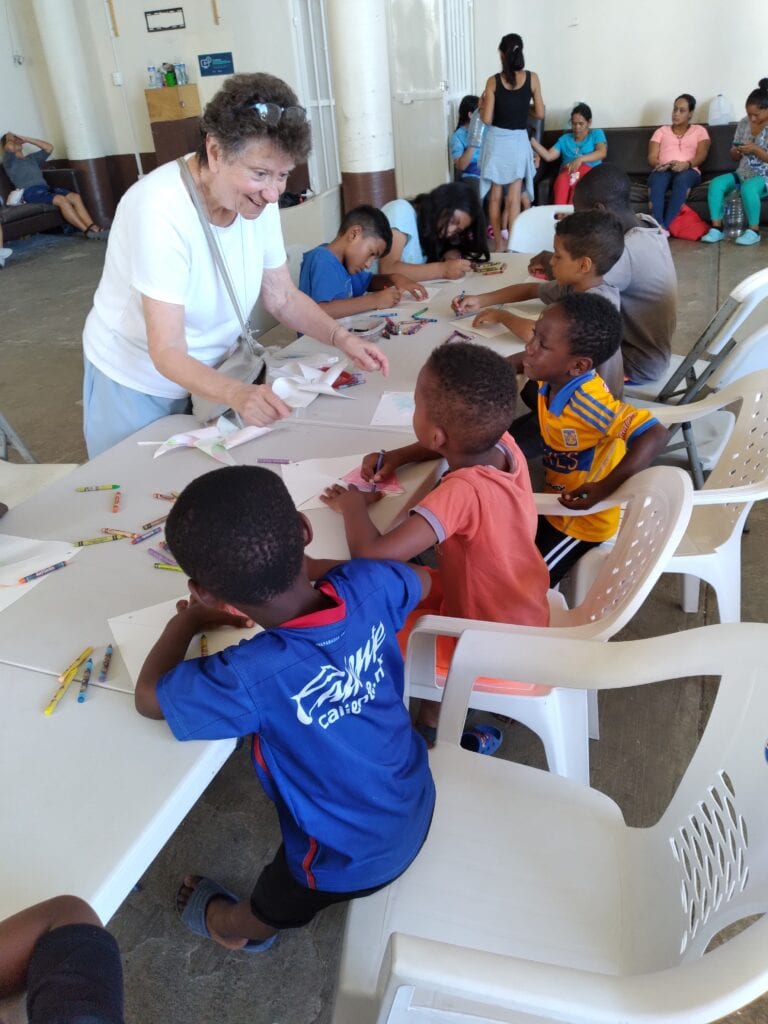
The emotional impact of watching all this unfold day by day was heart-rending as well as beautifully touching. I just wished I could do more to help these hopeful people reach their destinations. Some days, Linda and I worked on clothing request forms, but it was especially fulfilling for us to volunteer at the Respite Center’s Pharmacy/Supply area. To experience their gratitude and joy in receiving such basic toiletries and medicine was most humbling. We might have touched their lives with some basic supplies, but they touched our hearts with warm gratitude and loving smiles. Among the many blessings of this trip was the privilege of spending time with these beautiful people and their children. We saw how little they have but also observed their struggles, hopes, dreams and goodness. Hopefully, our actions demonstrated our compassion and care. Their plight reinforced our awareness of the many blessings we enjoy daily and often take for granted. Another gift of our ministry here was experiencing God’s providential care when we needed it most, i.e., not knowing any Spanish and a language translation chart appeared just in time to help us meet the basic requests of hundreds of migrants. Lastly, we merely passed through the lives of these migrants for a short time, but they will live in our thoughts and prayers forever.
July 2023
Encountering God on the journey,
a reflection from Elvia Yolanda Mata, IHM (Scranton)
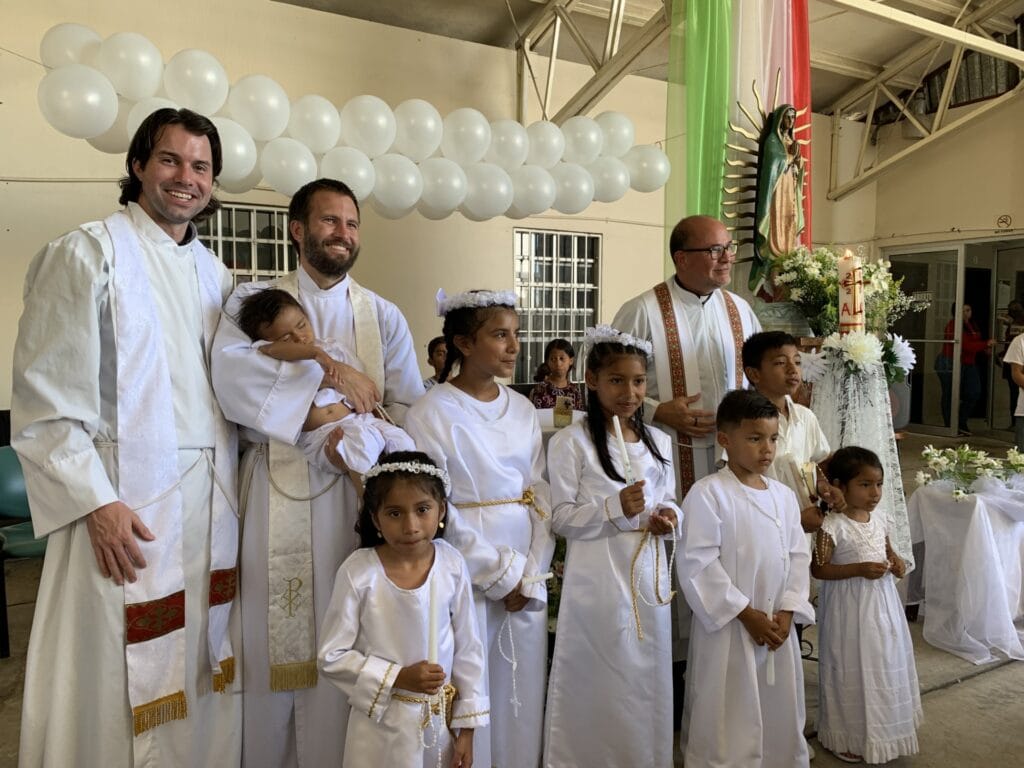
Everything that moves has life. For there to be life, there must be movement. Migrant people are in continuous movement. Not only moving physically but, above all, their spirits are in movement. It is in the process of movement that new experiences emerge. What are the reasons that migrant people are willing to be on the move? They journey in search of life, a better life for their families. They must leave their countries of origin, not because they want to, but because in their countries their lives are threatened. It is during their journey that they frequently come face to face with death, but it is also where they find a new meaning in their life. It is there in uncertainty that they encounter God.
There are many shortages and difficulties that migrants face during their journey, but the lack of food is one of the most painful shortages. I believe that those of us who have not had the experience of feeling hunger can find it difficult to comprehend the sensation of losing, little by little, the smallest reserve of energy that one’s body has. At the same time, these migrants must keep moving in order to obtain any food and thus maintain an energy level that will allow them to continue their journey.
It is very similar in their spiritual lives. When they are on the road, they realize that not only their body needs nourishment, but also their spirits. It is in that experience of weakness and being deprived that God comes to meet them, to nourish them and to strengthen them so that they can continue their journey.
The story of the people of Israel appears to continue to be present in a real, tangible, and concrete way in the here and now. Thousands of migrants continue to leave their countries in search of a better quality of life for their families. On that journey, they experience the need to be filled and nourished by God and they discover the strength that allows them to continue on their way.
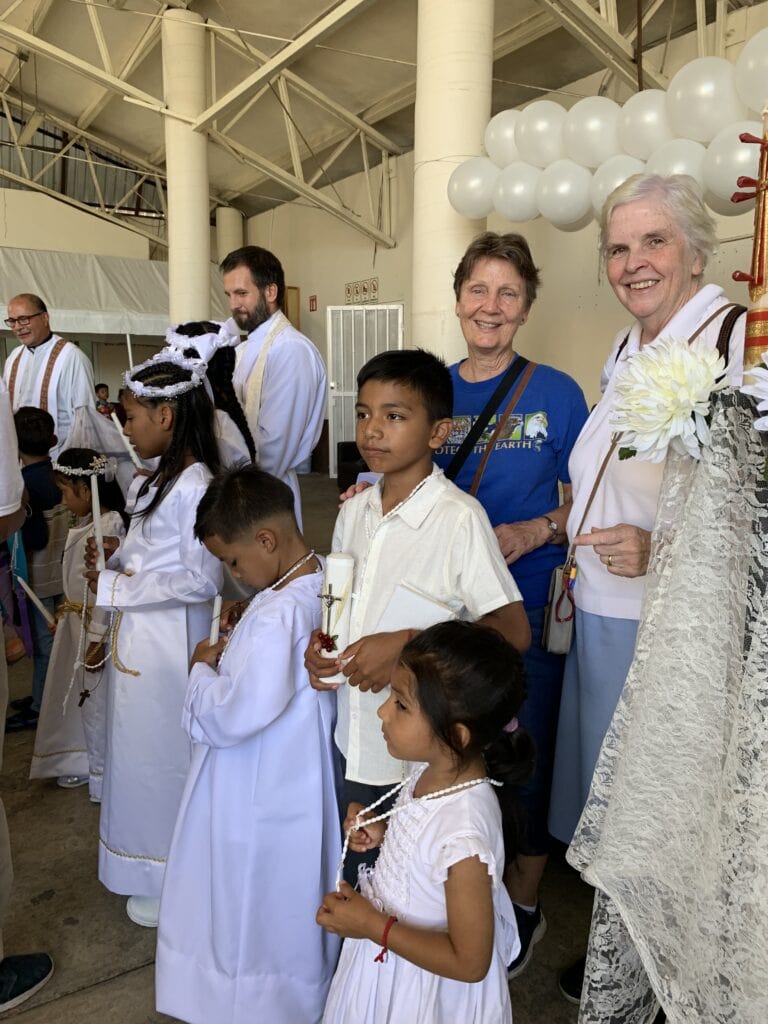
A few weeks ago, we had the opportunity to participate in the Eucharist where several of the migrant children received the sacraments of baptism and the Eucharist. The children ranged in age from one year to 12 years old. The joy of the children and their families was very evident. Talking to some of the parents and children who had received the sacraments, they clearly expressed how they felt the presence of God accompanying them during their long and difficult pilgrimage. That precise moment of receiving the sacraments meant much more to them than can be expressed here in words.
At other times, we have reflected that migrants travel just with what they are wearing, their important documents and some other small belongings. Something that really caught my attention that day was that, although their clothing was very simple, all the children who were receiving the sacraments were wearing something new: a hairpin, a pair of pants, a blouse, etc. What touched my heart the most was that they were all wearing new shoes. This seemingly unnoticed detail made me ponder many things. Perhaps these children in their short lives had never had the opportunity to wear a new garment, but that day was a special day. That was a special encounter with God, their Lord, who had protected them on their way. It caused me to think about what “new garment” (new thoughts, vision, attitudes) I need to wear each time God meets me in my daily life. There is definitely an invitation to keep moving so that my life does not stagnate.
Also, the fact that each child was wearing new shoes goes far beyond the simple fact of having a pair of new shoes. For a migrant, shoes are a vitally important possession to accomplish their journey. It enables them to keep moving and to keep searching for life. It is also for me an invitation to change my “shoes” (ideas, attitudes, ways of seeing life) that no longer help me to walk. Let this be the time to change “old shoes” and to put on new shoes to continue our personal journey and at the same time to continue our congregational walk to discover God who continues to meet us despite the fears, doubts, challenges, and uncertainties that we may encounter. It is in movement that God comes out to meet us when we take the time to notice.
June 2023
WHAT IS TITLE 42, TITLE 8 AND THE CBP ONE APP?
On May 11, 2023, the US government finally rescinded Title 42, a health policy that was invoked in March 2020 to prevent the spread of COVID-19 at US borders. Title 42 allowed US authorities to use the pandemic as justification for swiftly removing migrants crossing the US-Mexico border without hearing the requests and cases of asylum seekers. With the dissolution of Title 42, Title 8, the pre-pandemic law that governed the deportation of migrants, again forms the primary legal basis for US immigration policy.
Prior to the dissolution of Title 42, Homeland Security implemented the CBP One App. It is a mobile application that migrants in central or northern Mexico who are seeking to travel to the U.S. use to schedule an appointment at one of the southwest border land ports of entry. One of the purposes of the CBP One App was to bypass intermediaries and allow migrants to apply directly to Immigration for an interview without the interference of “coyotes.” Unfortunately, the app, which is considered the legal way to enter the US, has proved frustrating for many migrants. Some migrants cannot afford to buy a telephone, which they need to access the App. Others had their phone stolen or damaged during their long journey northward to the border. Large families of four or more may have a telephone, but they were unable to get interviews for all their family members at the same time. The result was that families were separated, some members crossing the border into the US while others remained indefinitely in Mexico trying to get an interview with Immigration.
Under Title 42, families who spent several months trying to access the CBP One App without any success sometimes resorted to crossing the Rio Grande River and handing themselves over to the Border Patrol. If they were lucky, they were processed by Border Patrol, released with documents and given a date to attend immigration court in a city near to where their sponsors live. The unlucky were “expelled” back into Mexico.
With the implementation of Title 8, migrants who cross the river and hand themselves into the Border Patrol will be “deported” and will be barred from applying for asylum and re-entering the US for at least five years. Likewise, migrants who traveled through other countries on their way to the US-Mexico border are also banned from applying for asylum in the US. In actuality, Title 8 is more punitive than Title 42.
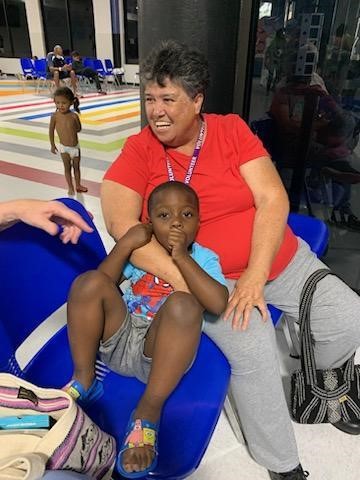
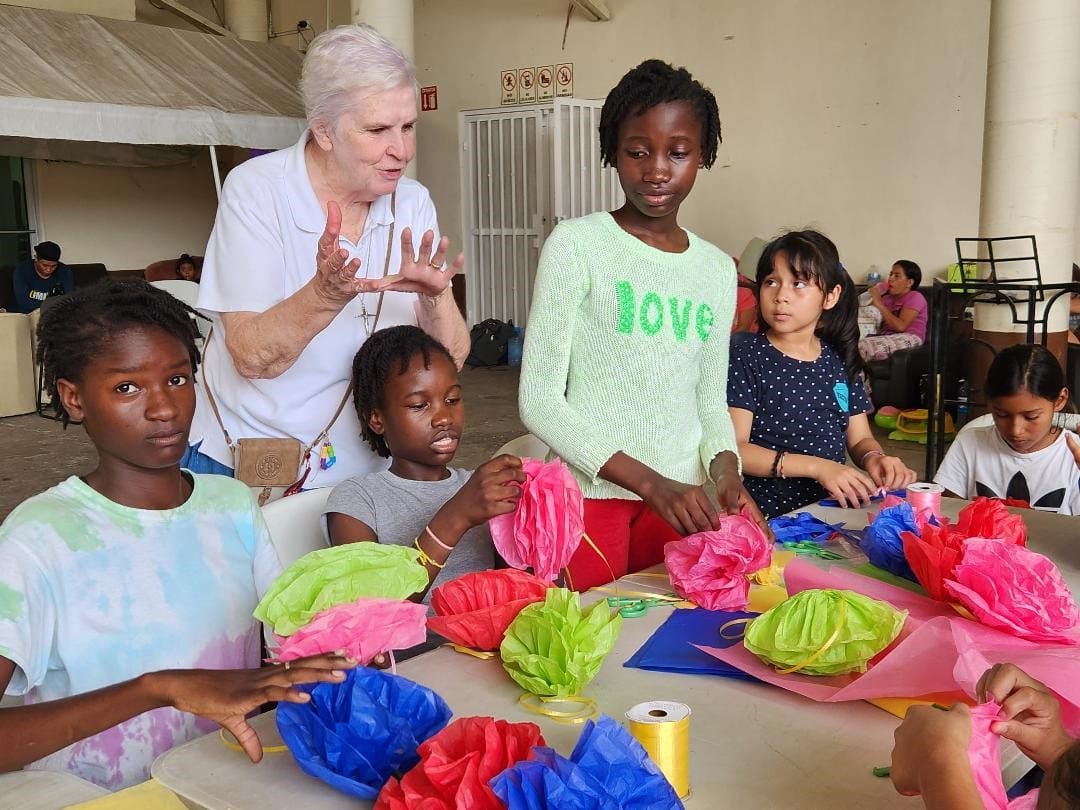
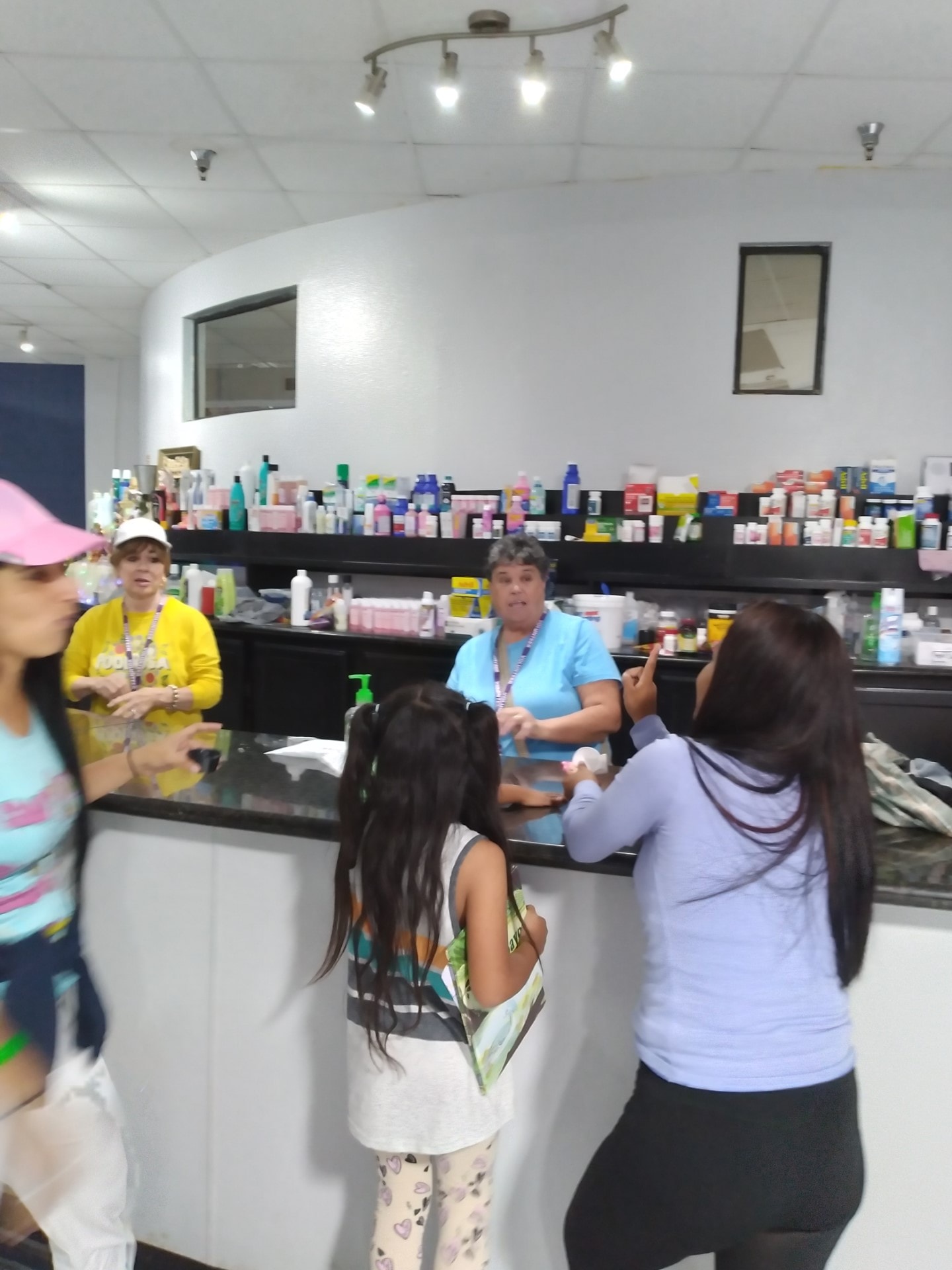
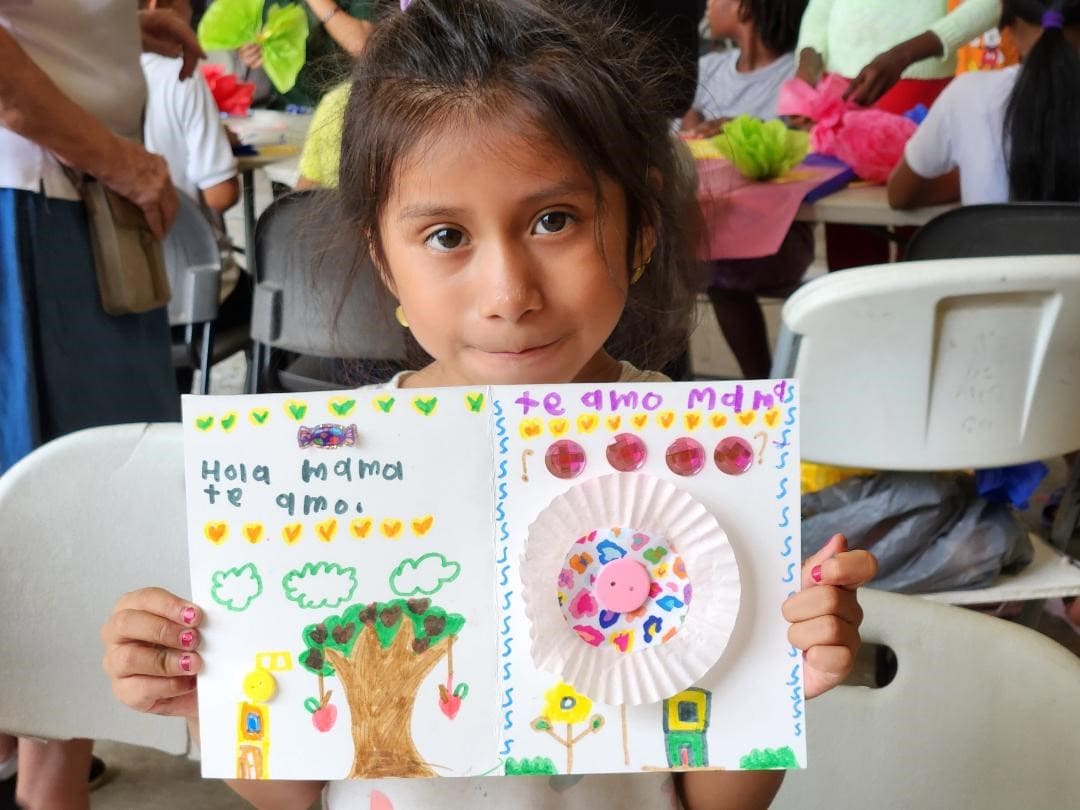
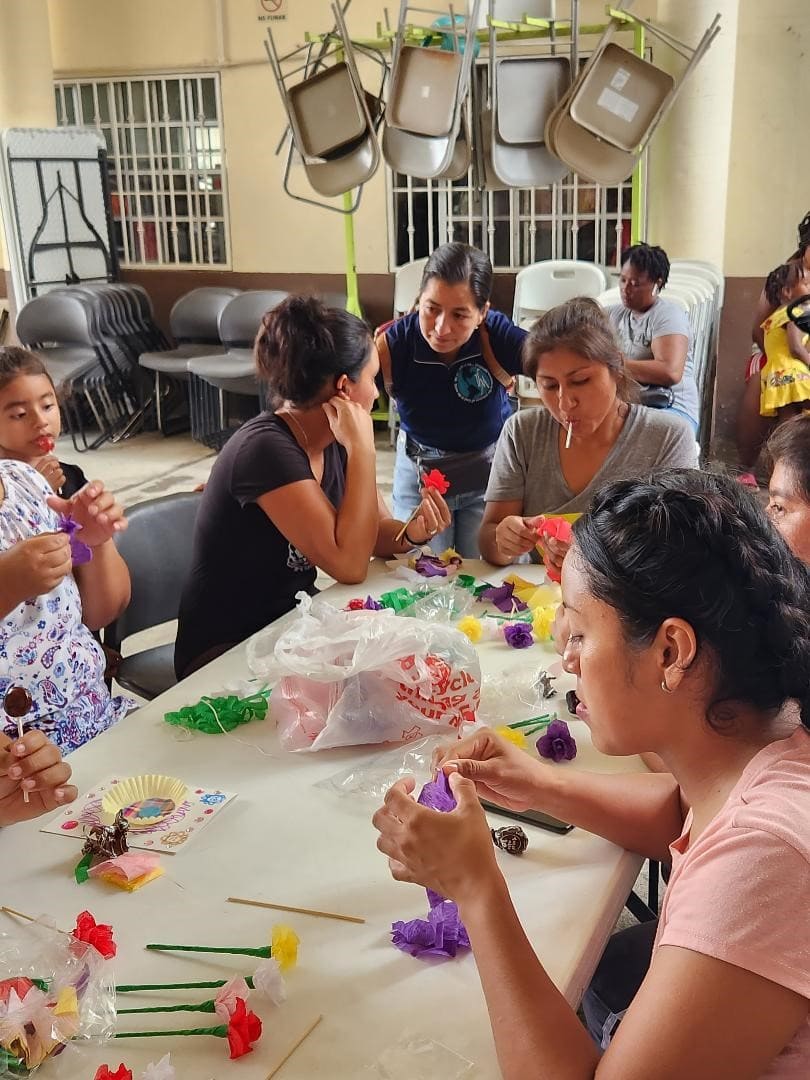
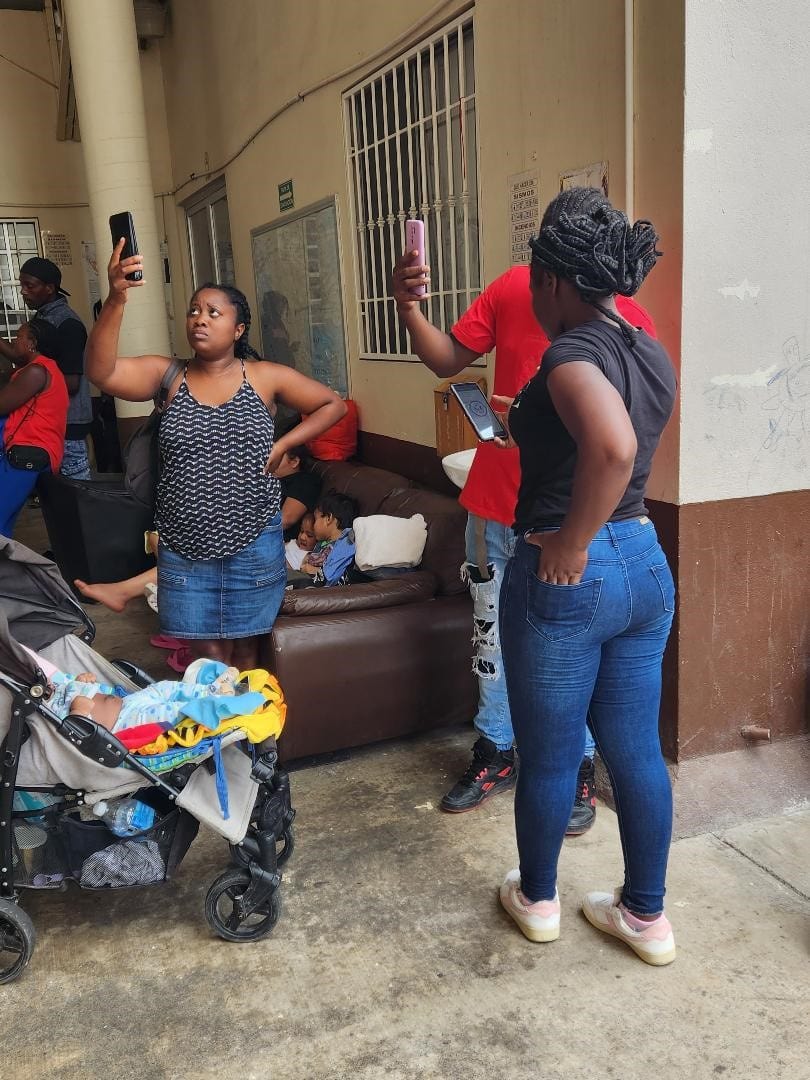
OSP-IHM MINISTRY AT THE BORDER BEFORE AND AFTER MAY 11
The surge of migrants at the southern border in the week before May 11 was the result of migrants’ fear of Title 8 restrictions and their frustration with the CBP One App. From May 8-15, our OSP-IHM Border Community spent mornings and afternoons at the Humanitarian Respite Center serving the increased number of migrants. The people and their needs were so many that it was hard to know where to begin. Many of those who had crossed had been detained for days by Immigration. They arrived hungry, sick and with only the clothes that they were wearing. Quite a few had been separated from family members and were desperate to locate their sons, daughters and husbands. We tried to use the online detainee locator service to help them find those who had been separated. But each time the system, which had not been updated, reported 0 results. It was heart-wrenching to see their disappointment and experience their anxiety.
Around May 15, the number of migrants at the Humanitarian Respite Center began to decrease. Although it is still a priority to respond to the basic physical needs (food, clothing and medicine) of the migrants, fewer people also mean that we are able to sit with them, hear their stories and offer them compassion and encouragement. The smaller numbers allow us to respond to their emotional and spiritual needs.
Because the number of those crossing into the US has decreased, there is a greater need to accompany migrants on the Mexican side of the border. Since last July, we have been volunteering on Thursdays at the Casa del Migrante in Reynosa, Mexico. We now are considering volunteering two days instead of just one in Mexico with the hope that we will be able to expand our presence to Senda de Vida II, an encampment of about 2,000 migrants on the outskirts of Reynosa. It is a ministerial adjustment that we are prepared to make because of the needs of the people and one that we foresaw when we chose McAllen, Texas, as our place of residence. We started this mission knowing that the work would call us to accompany our migrant brothers and sisters on both sides of the border.
April 2023
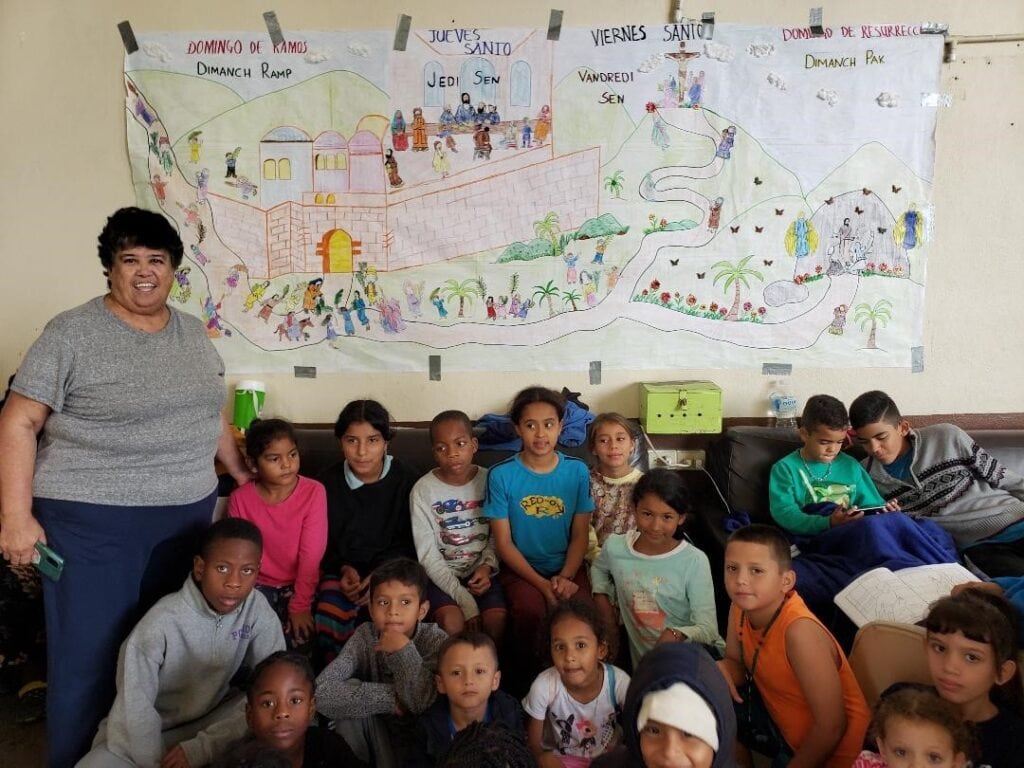
The OSP-IHM core community ministering at the border celebrated Holy Week with migrants at the Casa del Migrante in Reynosa, Mexico. The experience of walking with our suffering brothers and sisters was profoundly heart-wrenching and hope-filled.
To prepare for Holy Week, Sisters Carmen, Rose, Elvia and Mary Elaine, with the participation of the children, created a mural of Palm Sunday, Holy Thursday, Good Friday and Easter Sunday. They also helped the children to make “salvation bracelets” with a different color to commemorate each of the four days. The mural, which was hung on the wall, and the bracelet served as visual reminders of the sacred events that take place during Holy Week.
The celebrations took place in the open patio of the migrant shelter where there were no polished pews, ornate paintings nor marble sanctuary. A cement floor, metal folding chairs, a wooden altar, a simple cross, a plastic basin for washing feet and bells from the Dollar Store made the perfect scenario for experiencing the Paschal Mystery in our midst. The reverence with which the men, women and children in the Casa del Migrante participated in the washing of one another’s feet, Via Crucis and adoration of Jesus on the cross was testimony of their faith and hope in a God who accompanies them in their suffering and promises them new life. It is truly a privilege to accompany our migrant brothers and sisters in McAllen, Texas and Reynosa, Mexico.
March 2023
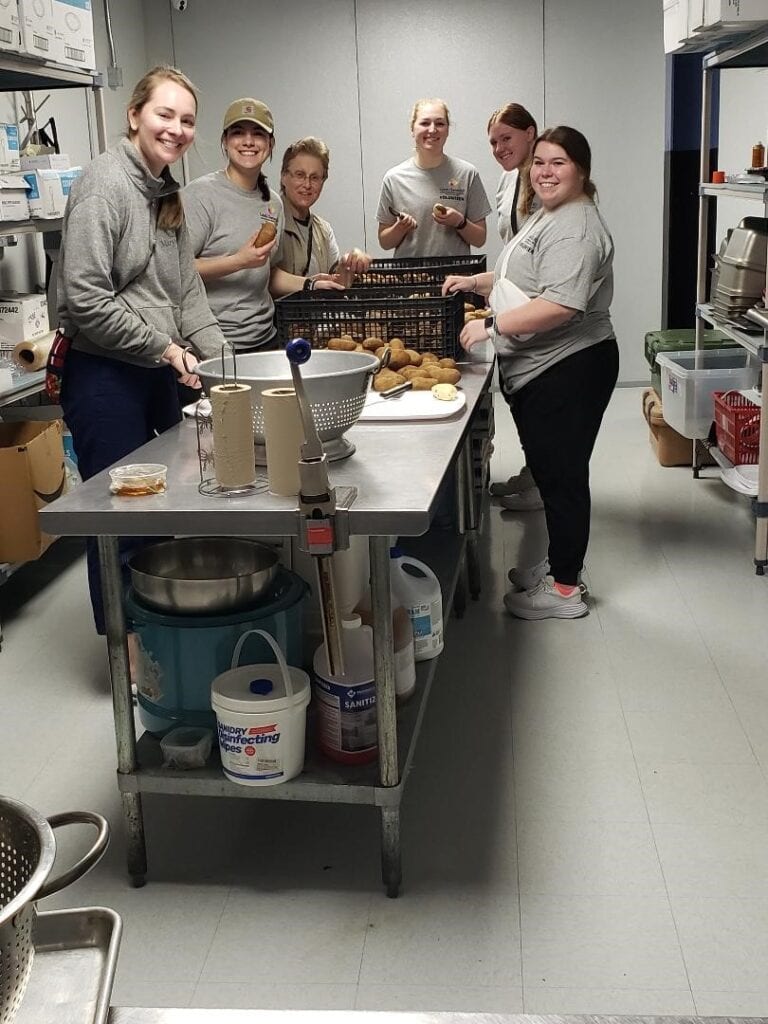
Our apostolate at the OSP-IHM Border Mission, “Mary, Comfort of Migrants,” includes receiving people who would like to volunteer for brief periods. The OSP-IHM Border Community commits to accompanying high school and university students who want to participate in the mission. Students and their chaperones stay at the Basilica Hotel on the grounds of the National Shrine of Our Lady of San Juan del Valle. Student service groups often choose to participate in a Border Witness Program provided by ARISE (sponsored ministry of the Sisters of Mercy) and volunteer at the Humanitarian Respite Center (HRC) under the direction of Catholic Charities. Group leaders are responsible for contacting both organizations and setting up their schedules of activities. The sisters in the OSP-IHM Border Mission are available to meet with the students and their leaders. They volunteer alongside them in McAllen, Texas and Reynosa, Mexico (if the group opts to cross the border). They also share prayer and one or more meals with them in their convent “Mary, Comfort of Migrants.”
During the past five weeks, we had the privilege of accompanying the following groups:
- 12 students and two teachers from Holy Name Academy, Tampa, Florida (where Sister Lisa Perkowski ministers).
- Four students and two group leaders (including Sister Donna Korba) from Marywood University, Scranton, Pennsylvania.
We look forward to meeting more students from the schools and universities where our OSP and IHM Sisters minister!
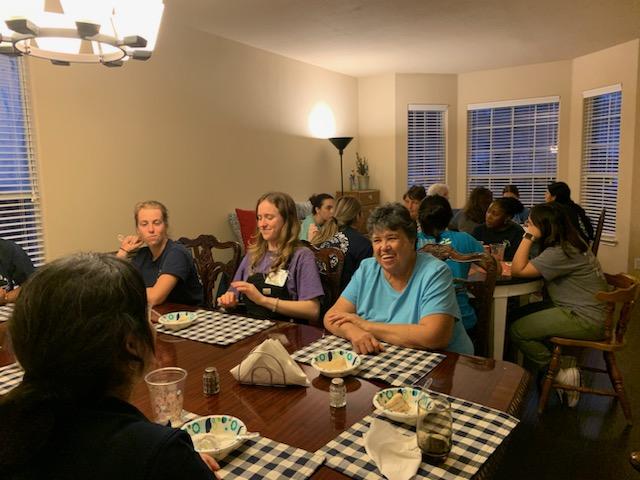
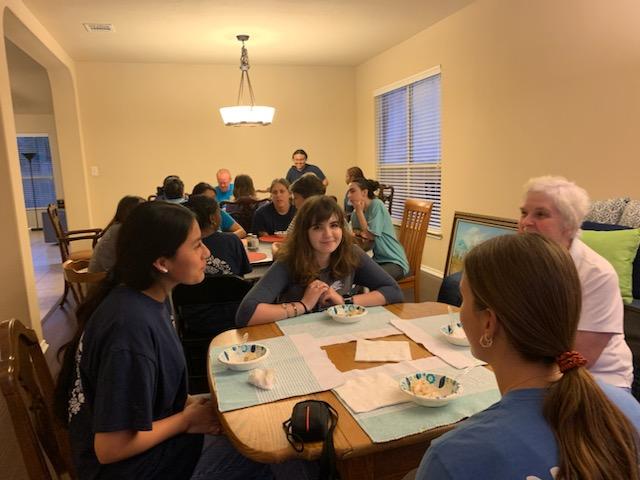
February 2023
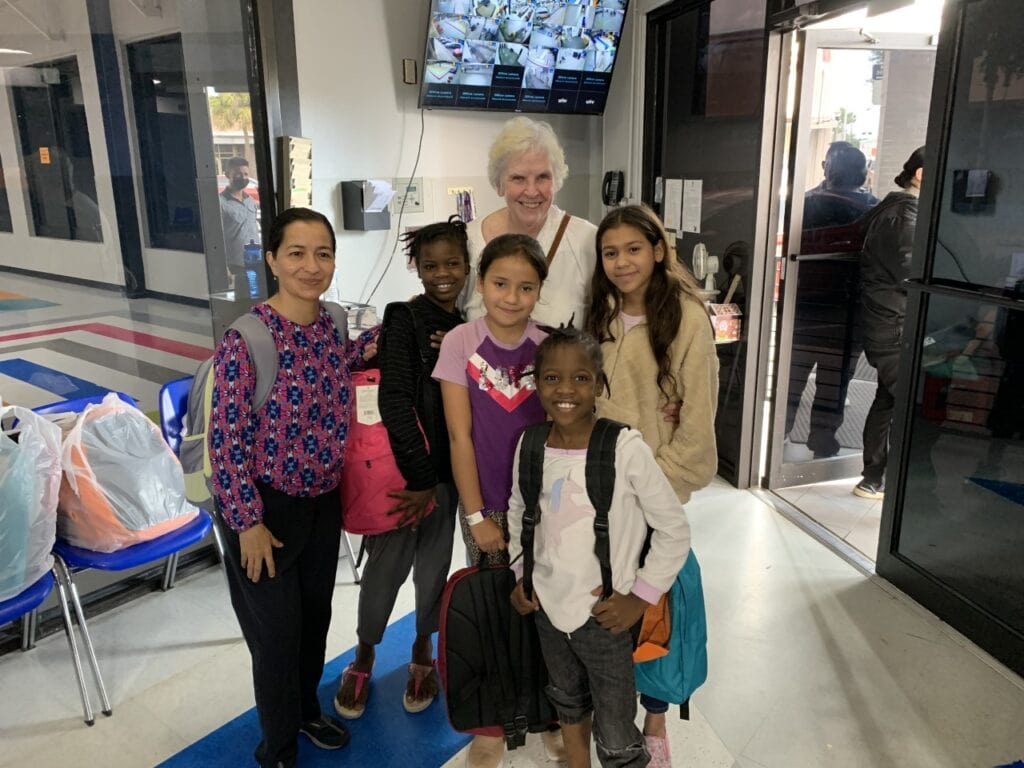
The OSP-IHM Core Community at the US-Mexico border would like to extend a heartfelt thank you to our sisters and associates who attended the presentation on February 13 via zoom or Livestream. It was wonderful to see so many faces and feel the energy of our four congregations. We invite you to view the recorded presentation that depicts a little bit of the reality of our migrant brothers and sisters as well as our own experiences of community life, ministry and inter-congregational collaboration at the border. Here is the link. To obtain the English transcript for the parts that are spoken in Spanish, please click here.
Since the presentation, many have asked how they might donate to our OSP-IHM collaborative ministry. Monetary donations will help us to buy food, clothing, medicine, toiletries and activity materials for migrants at the Casa del Migrante or Senda de Vida II in Reynosa, Mexico, and at the Humanitarian Respite Center in McAllen, Texas. Checks can be made payable to Sisters of IHM. Please put on the memo line, “Mary, Comfort of Migrants,” and mail to
Mary, Comfort of Migrants
c/o IHM Sisters
610 West Elm Avenue
Monroe, MI 48162
Schools and youth groups may prefer to collect school supplies or other articles rather than money. Donated articles might include travel-size toiletries, shoelaces, underwear, socks, t-shirts, gloves, hats and scarves. The clothing should be new. We will probably be putting together more backpacks for school-aged children and will need: #2 pencils, large erasers, glue sticks, colored pencils and crayons. No scissors or rulers, please! Boxes with donated goods can be mailed to
Sister Rose Patrice Kuhn, IHM
Mary, Comfort of Migrants
905 N. 50th Street
McAllen, TX 78501
January 2023
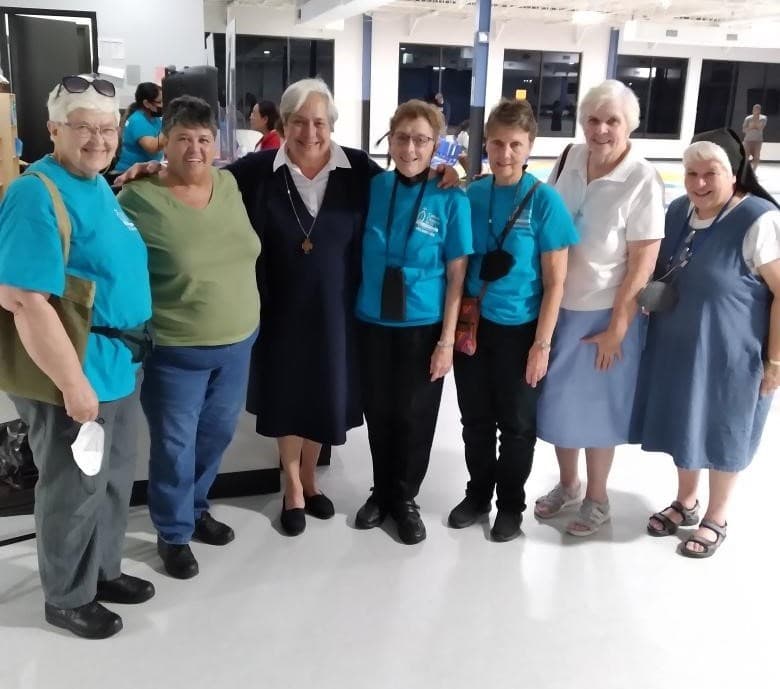
Sisters Mary (OSF), Carmen (IHM – M), Norma Pimentel (MJ), Pat (OSF), Mary Elaine (IHM – S), Rose Patrice (IHM – I) and Lisa (MSC)
Sister Carmen Armenta Lara, one of the four members of the OSP-IHM Core Community at the US-Mexico border, arrived on January 11 after many months of waiting for her R-1 Visa. Two Monroe IHMs—Sisters Maureen Kelly and Maria Antonia Aranda Diaz —who live and minister in Juarez, Mexico, accompanied Carmen on the 11-hour trip across the state of Texas and spent two days with the sisters in McAllen. Rose, Elvia and Mary Elaine welcomed Carmen and her companions with open arms!
December 2022
Recently, Monsignor Daniel Flores, Bishop of Brownsville, received a letter from Pope Francis, thanking him for the multiple ways that the People of God in his diocese are accompanying migrants at the Texas-Mexico border. Pope Francis wrote, “I have no doubt that the current situation [of migrants] should impel us to seek the promotion and integration of those who share the same condition in which the Lord found himself.”
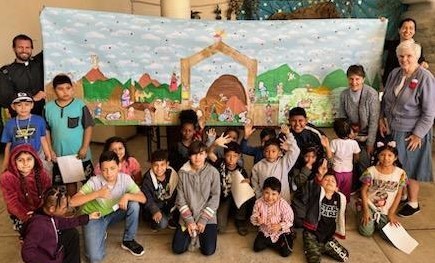
Welcoming and accompanying migrants who are fleeing violence and searching for a more humane way of life for themselves and their families is the loving work of all God’s People, not just those living along the southern border. The collaborative efforts of OSP-IHM sisters, associates and friends testify to the importance of encountering the migrant wherever he/she may be—on the border, in the classroom, in our churches and in our neighborhoods.
How are we OSP-IHM sisters, associates and friends responding to the plight of migrants from our own backyard?
- Sisters at Camilla Hall (Immaculata), Our Lady of Peace (Scranton), the IHM Senior Living Community (Monroe) and the Oblate Sisters of Providence motherhouse (Baltimore) hold in prayer the needs of migrant women, children and families.
- Students at Marian High School, Birmingham, Michigan, where the President is Monroe IHM Lenore Pochelski, collected money to purchase school supplies for migrant children who will be entering the U.S. school system for the first time and in the middle of the school year.
- Immaculata IHM Eileen Reilly has been volunteering with the New Sanctuary group at 30th Street Station in Philadelphia where she receives asylum seekers bused from the border, serves as their translator and gives compassionate care to them while they make contact with their sponsors.
- Scranton IHM Donna Korba will be accompanying Marywood University students to the border in March 2023. They will serve side by side with the OSP-IHM Border Community at the Humanitarian Respite Center in McAllen, Texas, and the Casa del Migrante in Reynosa, Mexico.
- During the Fall of 2022, the OSP-IHM Healing Racism Committee invited sisters and associates to attend three meetings to address the issue of advocacy for asylum seekers. The participants have written a letter to the governors asking them to work together in welcoming migrants to their states. The letter, which will be distributed once new governors have taken office, will be made available for those who wish to sign it.
- Donations from sisters, associates and friends help feed families living in migrant camps in Reynosa, Mexico, make basic medical and hygiene supplies available for families at the Humanitarian Respite Center in McAllen and provide art and school materials for migrant children.
The OSP-IHM Core Community in McAllen, Texas, is grateful to the larger OSP-IHM Family for their collaboration and the creative and multiple ways in which they engage to welcome and accompany migrants both at the border and throughout the U.S.
November 2022
Sister Camille Brouillard, IHM (Monroe) recently spent three weeks in McAllen, Texas
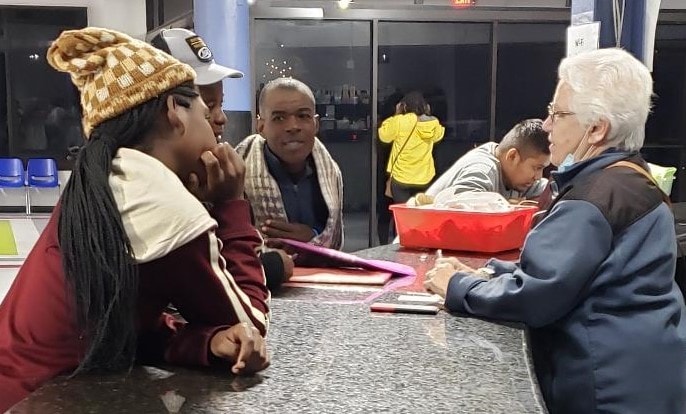
Humanitarian Respite Center
Sister Camille Brouillard, IHM (Monroe) recently spent three weeks in McAllen, Texas, with the OSP-IHM Border Community. The sisters invited Camille to join them because of her experience serving the Haitian population in Fort Lauderdale, Florida, for 14 years. At this time, many asylum seekers crossing the US-Mexico border are Haitians fleeing the violence and poverty of their country.
During her stay in Texas, Camille taught the sisters Haitian creole and also accompanied them to the Humanitarian Respite Center in McAllen and the Casa de Migrante and Senda 2 in Reynosa, Mexico, where she was able to speak with Haitian asylum seekers in their native language. This is what Camille writes about her experience:
We bring loving presence, welcome and God’s great love for the people who come seeking a non-violent, just place to live. The gift we receive is more than we give. To see the suffering, to see the smile at our being with the people and speaking their language, to listen to their story is to be about Jesus’ Liberating Mission indeed. I am blessed to be with our sisters from Scranton and Immaculata. Bondye beni yo! Bondye beni nou!” (God bless them! God bless us!)
Sister Camille Brouillard, IHM (Monroe)
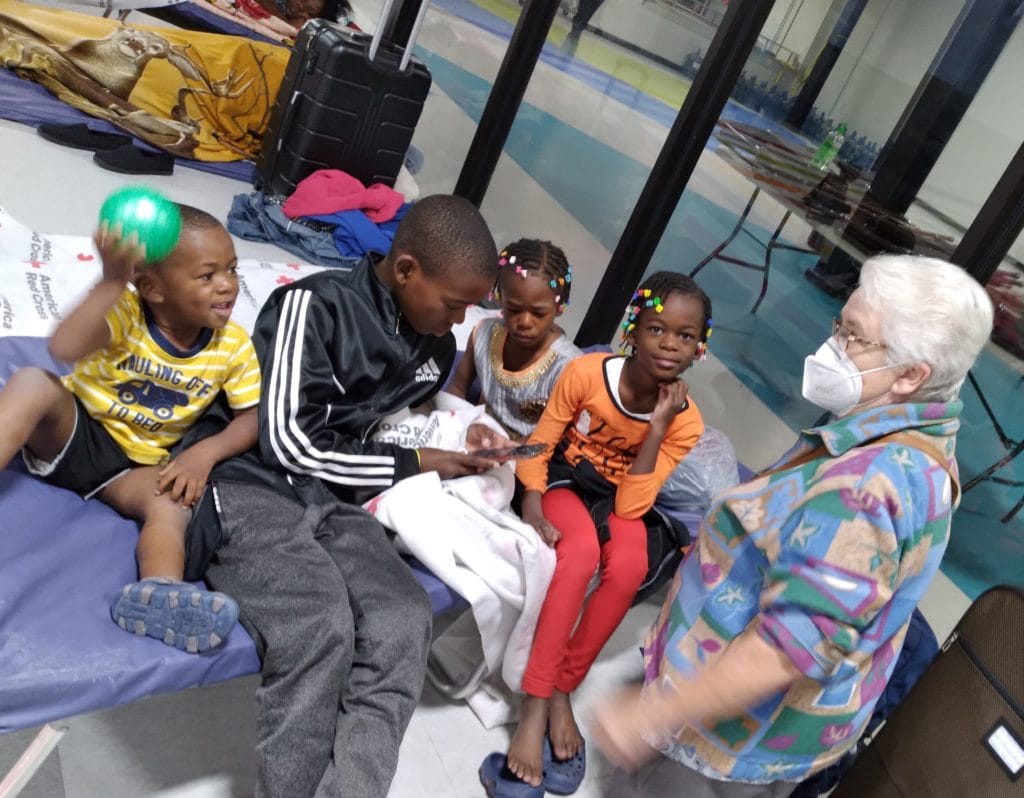
Humanitarian Respite Center.
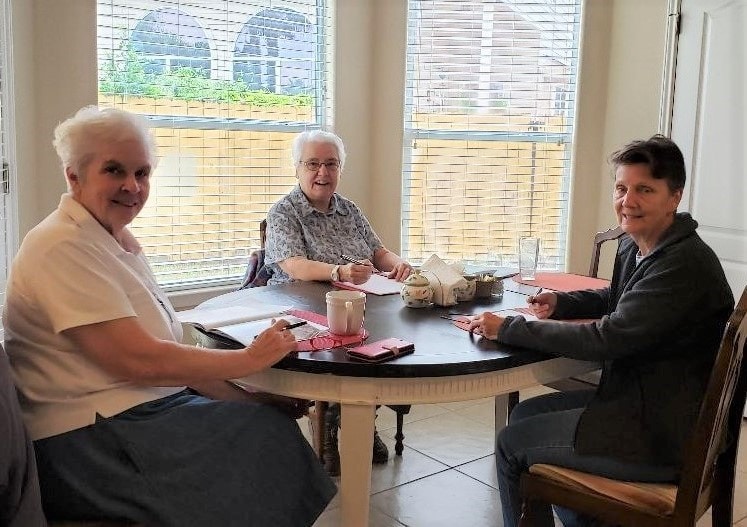
They are grateful to Camille for sharing her gift of language and presence with them.
We ask your continued prayer for our Haitian brothers and sisters and all who have valiantly made the journey to the US-Mexico border. It is a privilege to accompany them in the name of all IHMs and Oblate Sisters of Providence at this time.
October 2022
Leaders of the Oblate Sisters of Providence and the Sisters, Servants of the Immaculate Heart of Mary border community visit the border community
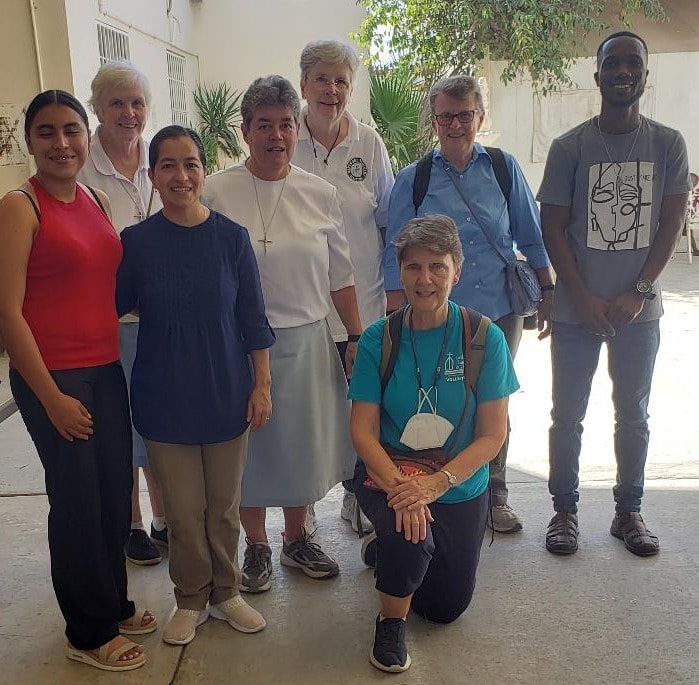
Reynosa, Mexico
Sisters Katie Clauss, Jane Herb and Mary Ellen Tennity traveled to McAllen, Texas, on October 14, to spend the weekend in community and ministry with the sisters living and serving on the Texas/Mexico border.
On Saturday morning, they walked across the International Bridge into Reynosa, Mexico, where they were received by the Daughters of Charity and about 150 asylum seekers in the Casa de Migrante. Sisters Rose Patrice Kuhn, Elvia Mata and Mary Elaine Anderson and a Haitian asylum seeker led the people in a bilingual (Spanish/ Creole) prayer. Afterwards, Sisters Elvia and Jane met with the women. Sisters Rose Patrice and Mary Ellen taught the older children how to identify, spend and make change with US coins and dollars. Sisters Mary Elaine and Katie played with the younger children.
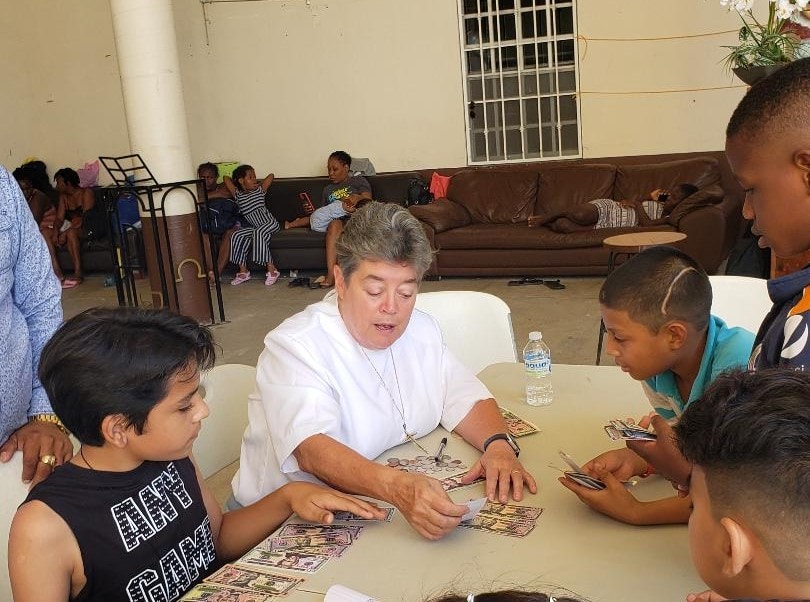
In the afternoon, the sisters visited the Humanitarian Respite Center (HRC) which welcomes migrants who have crossed the border. Sisters Rose Patrice, Elvia and Mary Elaine explained the ways in which they minister to asylum seekers at HRC. Later, the sisters participated in the celebration of the Eucharist at Our Lady of the Valley San Juan Basilica.
On Sunday morning, Sisters Jane, Mary Ellen, and Katie blessed the community living in McAllen, Texas, and their new home which they have named Mary, Comfort of Migrants. Sister Carmen Armenta, who is still waiting in Juarez, Mexico, for her visa to be approved, participated via video on What’s App.
The prayer began with these words:
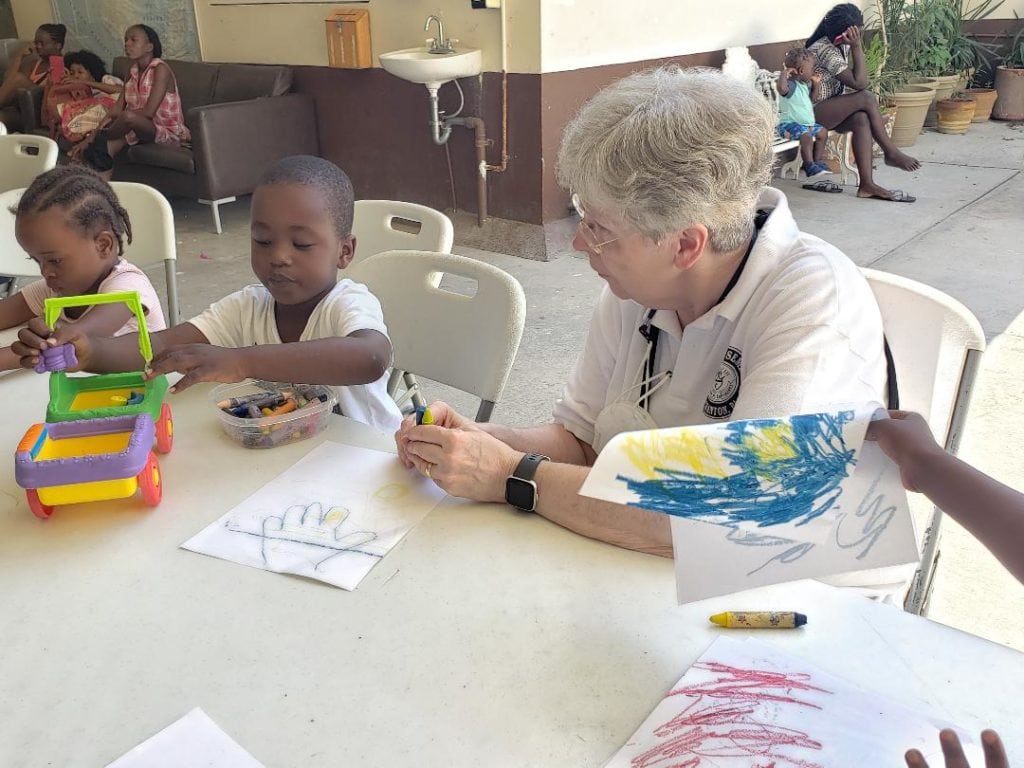
We come together here in this moment of our OSP/ISM history to ask for the blessing of God upo our response to the refugee crisis at the Texas/Mexican border. We stand here in the name of our entire community- members, asssociates, partners and benefactors.
The prayer concluded with the sending forth of Sisters Rose Patrice, Elvia, Carmen, and Mary Elaine to serve and be the face, ears, mouth, hands, shoulders, feet, and heart of compassion for our brothers and sisters at the border.
September 2022
Oblate Sisters of Providence and the Sisters, Servants of the Immaculate Heart of Mary border community learn Haitian creole
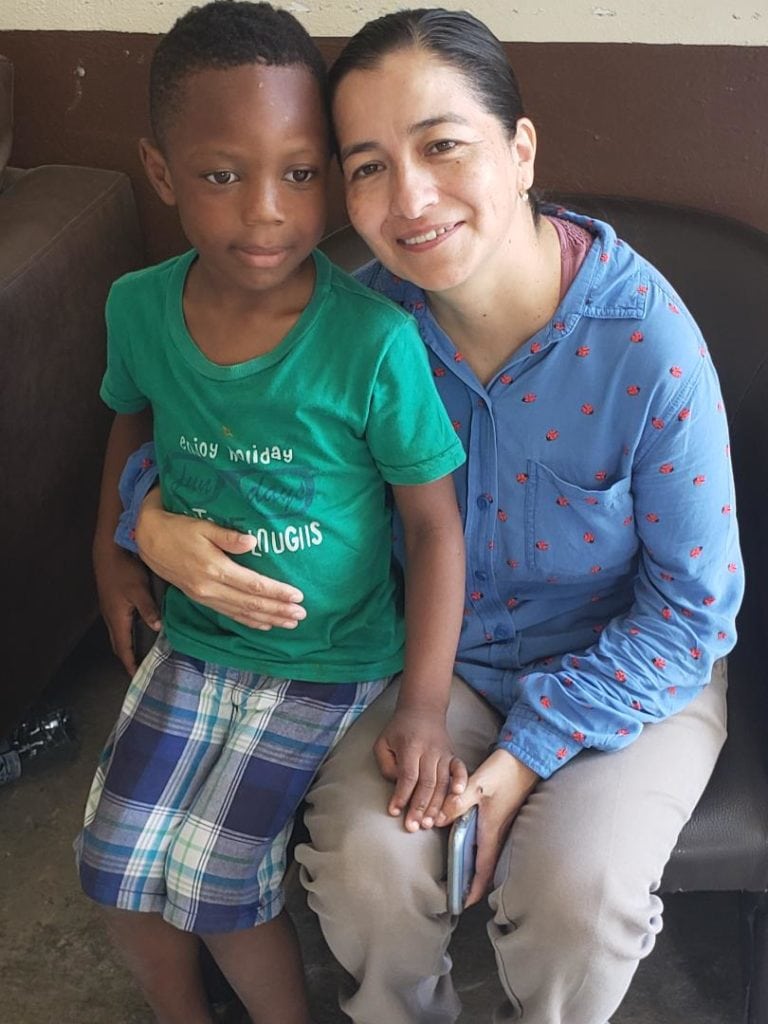
It seems right, and even providential, that in following Theresa Maxis’s urging to “go where the need is” we find ourselves face-to-face with our Haitian brothers and sisters. Theresa, born Almeide Maxis Duchemin, was the daughter of a Haitian refugee, and her maternal great-grandfather was a black slave in Haiti. As a child, Almeide attended a school for Haitian refugee children.
Of the many things that the OSP-IHM Border Community imagined doing in McAllen, Texas, studying Haitian creole was not one of them. Yet, because a large percentage of asylum seekers are Haitian, that is exactly what we are doing!
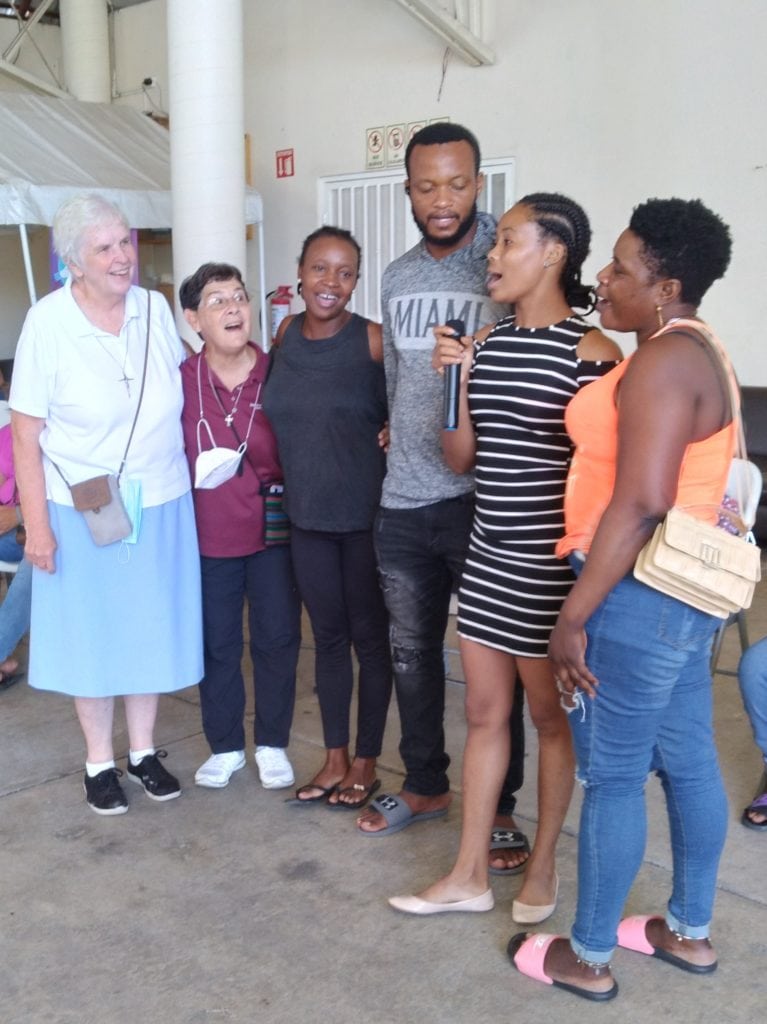
Could this encounter with the Haitian people and their culture be Theresa’s way of inviting us to look more closely at the roots and the legacy of our OSP and IHM congregations? Perhaps the culture that Theresa had to deny to “pass for white” is exactly what God is asking us to uncover and integrate into our lives. Learning Haitian creole is no easy task when you are an adult. Embracing the Haitian culture and the full personhood of Theresa Maxis may be even more challenging!
We welcome the insights of our sisters and associates who have served the Haitian population and may know the culture and the language well. We also ask you to pray for both our Haitian brothers and sisters who have valiantly made the journey to the US-Mexico border and us who have the privilege of accompanying them at this time.
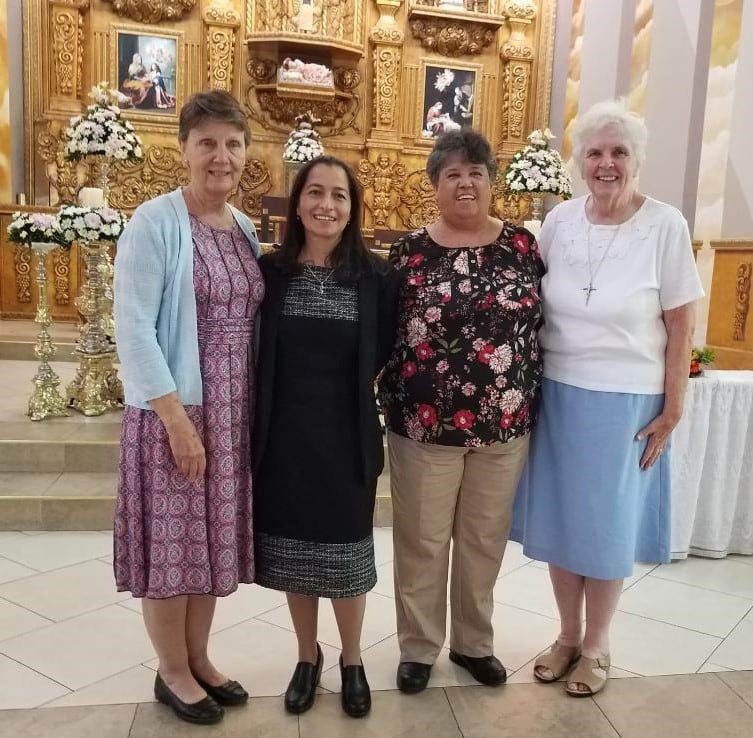
August 2022
Oblate Sisters of Providence and the Sisters, Servants of the Immaculate Heart of Mary border community participate in a Jubilee celebration in Monterrey, Mexico
Sisters Rose Patrice Kuhn, Elvia Mata Ortega and Mary Elaine Anderson have gradually settled into their new home, which is located about 20 minutes from the US-Mexico border. They have begun to minister daily to immigrants at the Humanitarian Respite Center in McAllen, Texas. The sisters have been waiting for the fourth member of their local community, Sister Carmen Armenta Lara, to obtain her visa and join them in McAllen.
The four sisters were finally able to meet in person for the first time in Monterrey, Mexico. The occasion was the 25th Jubilee Celebration of Sisters Elvia Mata Ortega and Maryalice Jacquinot. The opportunity to gather as a local community and to be in the presence of other IHM Sisters was appreciated particularly by Sister Carmen who is waiting patiently for her US visa to be approved.
I am grateful to God for the opportunity to know and share with the IHM Community of McAllen, Texas, and the IHM Sisters of Scranton. Elvia’s and Maryalice’s 25th Jubilee was a great celebration! I thank the Casa Hogar, Father Jesus Guadalupe and the community of Monterrey, Mexico, for their hospitality, their warm welcome and the time that they spent with us. I am looking forward to joining the sisters in McAllen soon and beginning our life together.
Sister Carmen
Please pray that Sister Carmen receives rapid approval for her visa and that she will soon be able to join the OSP-IHM border community.
*Summer 2021 border updates
For the past several years, these four communities have made a commitment to reconnect
and envision a common future. Read more about their shared ministries.
